#it's not even meta because it's not subtext. it's just text.
Note
Callum is so right about Rayla never doing anything for herself. You could say freeing Runaan was for herself but she also treats it as her "sacred promise" and chose him for Ethari too (shows how great her heart is). You think sparing Callum will finally count as her doing something for herself? Choosing her future and her love for him over the "greater good". She couldn't get her og parents back‚ this girl keeps losing and suffering she seriously deserves more wins
God, I could write an entire meta about that line - maybe one day when I'm feeling self indulgent. In regards to your actual prompt, re: saving Callum will count as something for herself -- a big yes, absolutely, I think! Though I think freeing her parents is something she deeply wanted for herself, too ("I miss you so much" / "so I wanted to do something for yourself for you") even if it was something she was continually putting off till the Aaravos situation, as far as she knew, was resolved
Prior to S6 I went back and forth on whether the show would frame Rayla's end of the possession plot line / trying to get Callum back as either "It doesn't matter what happens to me (again) I just want to save him" (which is what leaving in TTM and other moments was about) OR whether it'd be framed as "I refuse to sacrifice him / something I want (again)" and therefore be character development. I leaned towards the latter for reasons outlined here since the two have the chance to be even more thematically codependent than they already are in terms of their senses of identity:
As long as Callum is Callum (not possessed, or she has reason to believe he’s still in there), Rayla likely won’t be able to bring herself to kill him. This is from an emotional / characterization standpoint, of course, but from a thematic standpoint, we can see where it stems from Callum and Rayla continually being each other’s main connection to their sense of identity.
As long as Callum is Callum (“you’re the destiny is a book you write yourself guy”), he’s worth saving. As long as Callum is Callum, she can be Rayla (“Rayla’s brave. She saves people” / “Rayla. My name is Rayla, and I’m going home”). As long as she’s Rayla, he can be Callum. Because if Callum isn’t Callum, then he’s dead, and if he’s dead, she can kill him. And if Rayla kills him, if Callum is dead, then she won’t be Rayla anymore. Because to literally kill Callum would be to simultaneously symbolically/emotionally kill herself.
This goes both ways of course - Callum can't/won't sacrifice Rayla because to do so would be to sacrifice a fundamental part of himself (namely his deep and Pure devotion to others which means he'll never go entirely down the negative side of Viren's path, and keep to the positive - leaving Aaravos, breaking free, etc). This was subtext prior to S6, but now it's actual text (she's his light/truth/hope of salvation, etc) so it goes double going forward. This is true for Rayla too — Callum is her guiding light and her star, he's one of the people who's taught her the most about how to love and the person she wants to be.
With all that in mind, yeah, I do think that Rayla will choose to not sacrifice Callum for the right reasons. Part of this is scaffolded under witnessing Callum not sacrificing her No Matter What prior to her won choice, and realizing "what [she] most deeply desires" isn't just Callum's survival even, but specifically the life they can have together, which she needs to stick around for and thereby not sacrifice herself. Runaan is also explicitly remorseful over the actions he took towards her where he choose duty over love, so Rayla realizing she should choose love over duty ties into them growing together as well in a positive way. We also see her realize some of this I think in choosing to let Lain and Tiadrin stay together rather than separate them specifically because of the Moonphoenix bracelet Callum gave her as well.
"I risked losing the best thing I ever had" because of her own duty turned revenge vs "I refuse to lose either of us like this" and finally fully accepting an assassin was never who she was and never who she Should be, in sacrificing others' lives or her own included. Them both Choosing each other above everything else was exactly what I was hoping for as soon as the "I need you to kill me" plot line started / wrote in my first CHET fic pre-S4 years ago:
She has two options as she pulls away. She can make a grab for her swords and go out, swords blazing. Kill Viren or Aaravos if she can as the sky splits open, purple and thrumming with magic; die with a sword in her hand in all likelihood. The release spell has already started. Or she can help Callum up, and they can live to fight another day—together.
Rayla grips the back of his jacket. Presses her forehead to his neck for a second, tears building her eyes. “I’m sorry,” she says.
His arm tightens around her, like he’s braced for her to go. “Rayla—”
“I’m so sorry,” she repeats, sobbing. This is all her fault, but she can’t do that to him. “We have to get out of here.”
[...]
Callum is staring at her when she pulls back and she swallows hard. She doesn’t know what to say. It’s both a blessing and a curse when he speaks first.
“You chose me,” he says, not quite softly; she can tell there’s a lump in his throat. An edge of anger that not doing so was even an option.
“Yeah, well. It was about time,” she says quietly. “I—”
So uh, here's hoping!
#thanks for asking#mutual salvation theory#tategaminu#tdp rayla#s7 speculation#predictions#fic: just wait for me to come home#the moon arcanum connection in that fic being#the light & dark + love for rayla as constant truth + south star#we were all prophets lmao
25 notes
·
View notes
Text
"Kuniharu is a kind and funny dad, you're misconstruing canon if you call him abusive!!"
Literal intro chapter, the very first serialized chapter & first episode of the whole series:
- Kuniharu lies to his son in an attempt to guilt-trip him
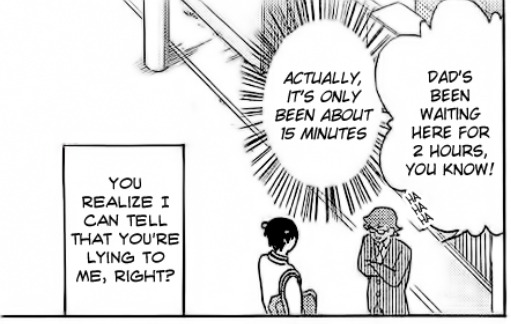
- Kuniharu thinks about, then suggests to his son that he start stealing money
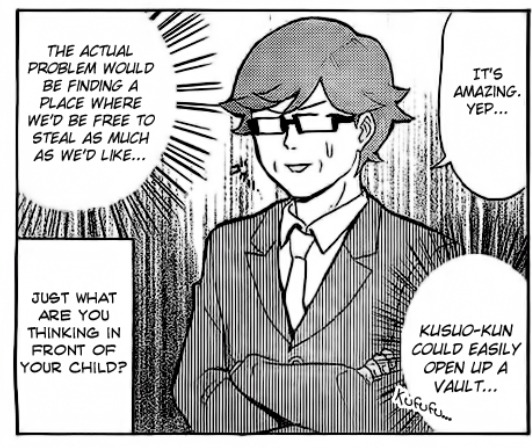
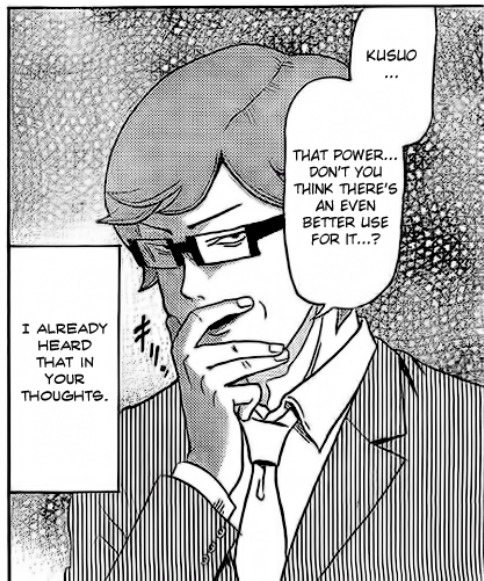
- Kusuo himself introduces his dad as a shameless and pitiable sleazeball.
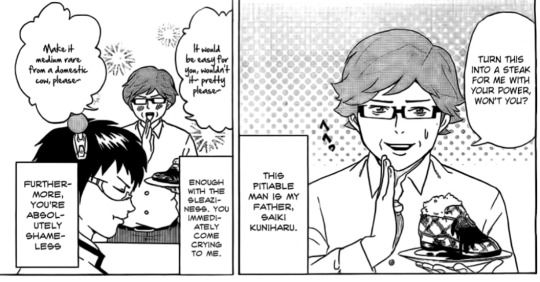
- Kuniharu dehumanizes his son by calling him "Kusuemon", a reference to Doraemon, a robot cat that serves a human.
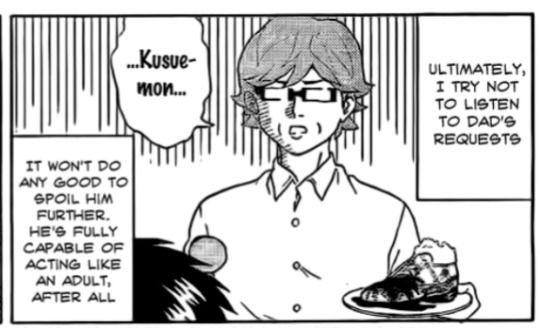
- It's revealed that Kuniharu "carelessly flew into a rage and smashed all the window panes in the house" because his "beloved" wife ate one (1) dessert out of the fridge, and he thinks that's a just and proportionate response and that "[they're] both to blame".
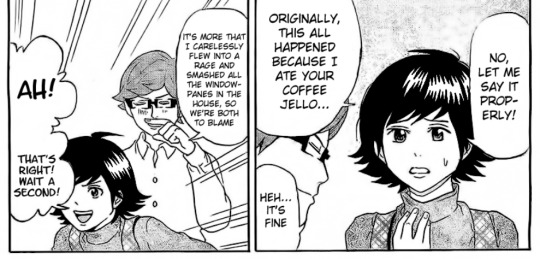
For reference, their house looks like this:


That's a lot of windows!
And even in the case of it being a gag manga, smashing all the windows in his own house over a minor offense by his wife is a completely insane level of retaliation. It doesn't matter that his son can instantly repair the house, the fact of the matter is that he had a long and extended violent outburst against his wife IN HIS INTRO EPISODE!!!!!!!
Kuniharu was NEVER meant to be seen as a good person because he's not. He's (at BEST) a constant source of annoyance for his son and a crappy husband who can't even do his job right, licking shoes to compensate for his ongoing problems at work:
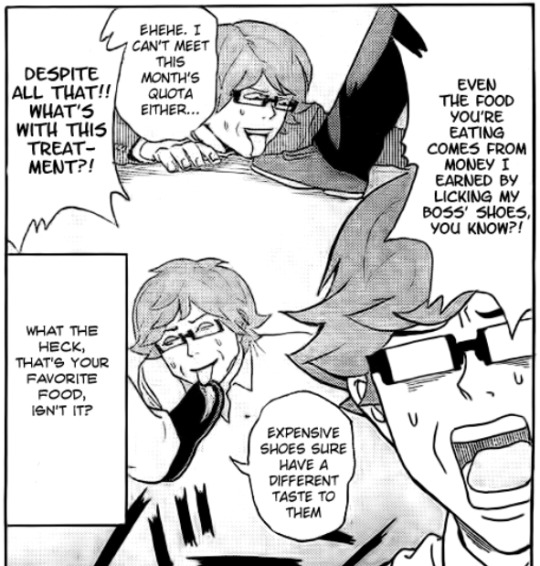
It's fine to enjoy him as a character, he IS really funny in his insanity, but to say that people are making stuff up about him being abusive is a ridiculous statement.
The concept of "child abuse" includes psychological and emotional mistreatment or neglect by a parent, it's not just about physical assault. One definition of psychological child abuse is:
"A repeated pattern of caregiver behavior or extreme incident(s) that convey to children that they are worthless, flawed, unloved, unwanted, endangered, or only of value in meeting another's needs."
Kuniharu hardly interacts with his son except to seek favors or to try to assert dominance/superiority. He constantly refers to Kusuo as a monster/robot/nonhuman (dehumanization, another form of abuse).
During the favorability/love meter chapter, both Kuniharu and Kusuo were certain that the love score would be very low due how little Kuniharu cares for his son. The fact that the score doesn't go down doesn't actually mean much if his literal mind-reading son could not tell that he was loved.
In fact, just as Kusuo's kindness can be explained by Kurumi's influence, Kusuo's tendency to self-blame, his trouble forming bonds with others, and his extreme conflict-avoidance can be seen as classic results of childhood emotional/psychological abuse.
And sure, Kusuke (who's introduced wayyyyyyyy later) might be the source of some of this trauma, but literally who raised him lol?
Anyways. You're ignoring canon if you think Kuniharu is a good dad or person, which is fine! Just recognize that.
"It's a gag manga, it's not that serious" <- Even in a gag manga world, Kusuo himself says that his dad is kind of garbage and that his mother is the only reason he hasn't exploded the planet. And the whole premise of the series is that he's fucking miserable.
The fact that bad things are presented in a funny way doesn't make them less bad, especially not from an in-canon perspective. A war in a gag manga is not really that funny to the characters themselves.
And exploring different aspects of a work is literally one of the main activities to do in fandom. If you only want to see exactly what's in the show exactly as it's presented in the show, then go rewatch it! Maybe you'll catch a few more details this time too.
#kuniharu saiki#nopsi meta#it's not even meta because it's not subtext. it's just text.#cw abuse#under a cut so the people who are in love with Kuniharu can choose to scroll past. get better soon <3
44 notes
·
View notes
Text
A Nightingale Sang in 1941
This is my inaugural meta (yay!) Eventually I will learn how to add gifs and whatnot to make this more interesting but today, I give you a wall of text.
I need to give credit where credit is due to three existing metas that I’m drawing upon heavily here:
A speculative continuation of the 1941 story, which includes an almost-kiss while “A Nightingale Sang in Berkeley Square” plays on the gramophone,
A behavioral analysis of Aziraphale during the S2E6 finale (will find ref later if possible)
A meta-analysis of the way in which “coffee” is used as a symbolic equivalent for liberty and freedom of choice, a running theme of this show (will find ref later if possible)
I’m going to expand upon meta #2 and #3 and explain why I think there is are very compelling reasons to believe that #1 will be canonized.
At the end of S1E6, an instrumental version of “A Nightingale Sang in Berkeley Square” plays diegetically, but the lyrical version plays non-diegetically over the credits (we hear it but the protagonists don’t). So we the audience could plausibly say “that’s their song,” but as of the close of S1, we have no reason to believe that they know that it’s their song. Even Aziraphale’s S1E3 (1967) suggestion that they dine at the Ritz could be a reference that only he gets, or just a fancy restaurant suggestion.
So when I was watching S2E6 and Crowley said “no nightingales,” I was jarred. What does that even mean? We know it has something to do with dining at the Ritz, but what does it mean to them? The reference only works if they know it’s their song. But we’ve only ever seen them hear it together after the averted apocalypse; if this is the direct reference that Crowley is making, it leaves our 1967 reference contextless and twisting in the wind.
If we assume that there was a romantic story beat in 1941, wherein “A Nightingale Sang in Berkeley Square” (which, incidentally, was written in 1939 and saw the height of its popularity at the end of 1940, so timeline-wise it’s spot-on) became their song, then a lot of events get renewed interpretations through this lens, in a way that makes this story much more cohesive and the “no nightingales” comment even more soul-shattering than it already was.
Let’s presume that immediately after this became their song and just as they were discovering their romantic potential, they were forced back into hiding. Forever after, references to the song serve as a macro for “I’d like to pick up where we left off that night.”
The 1967 suggestion of “dining at the Ritz” now becomes a directly romantic suggestion. It also gives better context for “you go too fast for me.”
Actually going to the Ritz in 2019 is not simply a celebration or even a callback to 1967, it’s a callback to their almost-romance of 1941.
When Crowley says “no nightingales” in 2023, this isn’t to say “we’re not going to eat together at the Ritz anymore.” It’s saying that the romance that began that night, the precious, fragile romance, is over.
I’ll give you a moment to dry your eyes before we move on to metas #2 and #3.
In light that this is what has been going on - they know they want a romantic relationship but have gotten so used to hiding and denying it that they are more comfortable keeping the status quo static and quo-y then trying to achieve their ideal - a lot of S2 behavior can get a fresh view.
Crowley’s reaction to Nina isn’t a realization that he’s in love - he knew that already. You can only ask someone to run away with you so many times before you are forced to admit some things to yourself. No, he’s realizing that trying to hide it (which was justified by survival), hasn’t been working, but despite failing at being stealth nothing bad has happened. He’s realizing that it may finally be safe to show it.
Crowley’s confession, then, is not a revelation. It’s making the subtext text. He’s not telling Aziraphale anything he didn’t already know. He’s saying it now because he thinks he’s safe to do so. Pin in that.
Lots of people have lots of theories about Aziraphale’s motivations in the S2 finale, which can more or less be divided into 4 camps: the genuinely held belief, the coffee theory, the lie theory, and the mutual trick theory (some version of the body-switching at the end of S1). Let me start by saying that I love all the fans and all their theories and I find their analyses to be insightful. The genuinely held belief theory, while I believe it to be erroneous, has been incredibly conducive to so many wonderful conversations and I love being in a community that has those conversations. But I’m going to explain why I think the lie theory finds the most support in canon.
Re-watch the finale (when you feel like you can) from 35:18 to 36:19 and then from 40:45 to the end, paying very close attention to Aziraphale’s words and his eyes. Michael Sheen is telling us a LOT with his eyes, and in the back half of the finale scene, with pacing.
For 60 seconds of footage, this setup is doing a lot of work. If Neil Gaiman wasn’t doing enough to beat us over the head with how evil the Metatron is, that glare at Crowley at the end with the non-diegetic ominous horns should convey the message. But again, focusing on Aziraphale. He initially refuses to talk to the Metatron; he’s made his position quite clear. There is no hint of regret or wavering; this is not someone who’s aching to return to the fold. The Metatron ignores his refusal and functionally forces him to accept a “cup of coffee.” The coffee isn’t spiked, but it is a metaphor. It is symbolic of choice. The Metatron is going to force Aziraphale to make a choice. Meta #3 does a great job of exploring the idea that a choice between anything and death is never really a choice. Hang onto that thought.
Notice I had you start up again 3 seconds before “The Conversation.” That’s because it’s important to note where the Metatron is right now. He is across the street, staring straight in through those giant windows to where our protagonists are about to have The Conversation. He is watching.
When Aziraphale returns, Crowley begins his “let me talk” riff. Aziraphale ought to be interested in what Crowley has to say, since the preamble is pretty compelling. You’ll notice that Aziraphale quickly turns to the window and back, through which he (but not we) can see the Metatron standing there, watching them. Aziraphale is then doing his best to get Crowley to STFU without raising the suspicion of the Metatron, eventually having to cut him off.
Because unfortunately, Crowley’s entire impetus for speaking up now is that it’s safe to do so. Only Aziraphale knows that they are in very real danger (or at least, Crowley is, but I’ll come back to that).
You might take something from the fact that he’s shaking his head while talking about “incredibly good news,” and seems to self-censor his criticism of Metatron (or more specifically, he takes ownership of any criticism of the Metatron, censoring out Crowley’s role in that, with the emphasis on I in “I might have misjudged him”).
Notice in the flashback that he begins the conversation reasonably relaxed. The Metatron also says a series of things about him that not only are false, but everyone, including the Metatron and Crowley, know are false: Aziraphale is not a leader, he’s a defector; he’s not honest, he lies all the time, in fact this entire season revolved around his one huge lie of hiding Gabriel. Not only does the justification not make sense coming from Metatron, but it shouldn’t make sense that Aziraphale would accept these reasons and it shouldn’t make sense to Crowley either. So is Aziraphale including these details in his recounting to Crowley so that he will get suspicious and figure out the jig? Maybe. Let’s continue.
Immediately upon being offered the job of Supreme Archangel, Aziraphale says “but I don’t want to go back to Heaven.” This is direct evidence against the genuinely held belief theory. If returning to Heaven and making a difference was a genuine motivation, we would have gotten a different response at this moment. But then we get something more.
“Where would I get my coffee?”
This is a beautiful response for a number of reasons; coffee should be trivial compared to the opportunity to be a Supreme Archangel, so it serves to highlight just how little interest Aziraphale has in returning. Taken at face value, it’s the Aziraphale equivalent of “not even at gunpoint.” But remember that coffee is a metaphor for liberty in this universe and this season. So what Aziraphale just said, in the language of Neil Gaiman metaphors, is:
I don’t want to go back to Heaven, I would rather have free will.
What does the Metatron do next?
He brings up Crowley.
Watch Aziraphale’s eyes before and after the mention of Crowley. He goes from confused to eye-flicking panic in the space of two syllables. Aziraphale already understands that his “no” is not being accepted, and that bringing Crowley into it can only possibly serve as a threat.
So the coffee, the choice, is a false choice. No one ever orders death. The Metatron has forced Aziraphale into a situation that looks an awful lot like a choice (it comes in a blue cup, after all) but it isn’t.
We definitely have some reliable narrator problems here. I’m going to presume for purposes of analysis that these cut-outs are accurate but incomplete, and that a more explicit threat about what would happen to Crowley if Aziraphale did not return to Heaven was made.
If we assume that Aziraphale has been made aware of a threat and is trying to hide that from Crowley, the rest of this scene reads very differently. Aziraphale cannot say, “you are in danger but you will be safe if you swear your allegiance to Heaven” or “I have to go, no matter what, and the only way we can be together is if you come with me,” but nonetheless he now has to convince Crowley to do the one thing he ought to know Crowley definitely doesn’t want to do all through subtext. Which we’ve spent an entire season establishing that they can’t communicate well when they are allowed to use their words. Disastrously, this is not a magic trick that Aziraphale can make work when it counts. Their failure to practice good communication means that, right now, when it counts most, they are not going to pull it off.
We see that Aziraphale is very hopeful that Crowley will pick up on his cues and play along. Obviously, he doesn’t.
If the whole riff about Hell being bad guys and Heaven being the side of truth and light is taken as genuine, it discards a massive amount of character development that we’ve witnessed in Job, Edinburgh, etc. (again, to all the genuine belief subscribers, I think it’s a compelling argument but it simply doesn’t account for the evidence). So if it’s not genuine, why say it? Again, to alert Crowley that something is Off, because Crowley should know that Aziraphale doesn’t actually believe that. They saved humanity from Heaven and Hell. They hid Gabriel from Heaven and Hell. Crowley knows that Aziraphale knows that Heaven and Hell are just two sides of the same coin. Notice again that Aziraphale glances out the window while he’s talking up Heaven; he knows the Metatron is watching, he can’t not defend the position of Heaven. I think it’s also worth noting that Aziraphale forcefully glances and gestures off to Crowley’s left (away from the window) when talking about Hell, and then turns his head to Crowley’s right (towards the window) to try to get him to realize that a representative of Heaven is literally standing right over there, just look out the window please dumbass!
When Crowley is asking Aziraphale if he said no, and we see the back of Aziraphale’s head, again we can see him turn his head to glance out the window. This is also when he changes strategies, and admits that Heaven could use a little reform. Because now there’s a problem almost as big as getting caught, which is that he won’t be able to get Crowley to go with him.
Which unfortunately makes the next part of this so much more heartbreaking. Because when Crowley begins his speech about being a team, Aziraphale wants to hear it. He can’t bring himself to shut down Crowley again, even though it could get them both in massive trouble. Notice that he glances out the window again during this, and the look of panic on his face. He begins to shake his head when Crowley mentions that Heaven and Hell are toxic; this can be taken a lot of ways but I’ll argue for the interpretation that he’s trying to get Crowley to STFU and stop saying shit that could get him destroyed.
After Crowley puts on his sunglasses we are in the “back half” and Sheen is doing a lot with phrasing here, specifically pregnant pauses.
“Come with me… to Heaven!”
“We can be together… as angels!”
Based on the pacing decision I am thoroughly convinced that the first half of each of these statements is intended to be the message to Crowley and the second half is always a qualifying statement to satisfy the Metatron.
Unfortunately, these pregnant pauses are completely backfiring in their effect on Crowley. The sentiment gives him hope and the qualifying statement crushes it again immediately. He is being taken on a horrible emotional rollercoaster with these declarations which are only further amping up his instinct to run away.
The only truly genuine, unaldulterated statement I think we get from Aziraphale is
“I need you!”
When it becomes clear to Aziraphale that there’s been an irreparable breakdown of communication between them and the subtext is not getting across, he says:
“I don’t think you understand what I’m offering you.”
He means this literally. Crowley has not understood that Aziraphale is offering him protection from whatever threat the Metatron has made.
Which makes this part extra-devastating and also absolutely in keeping with a major running theme of this season.
“I understand. I think I understand a whole lot better than you do.”
Your understanding and my understanding are different understandings.
Crowley views the offer to return to Heaven through the lens of his trauma. He understands what life in Heaven would be like. But he doesn’t understand that Aziraphale is offering him protection.
But Aziraphale just heard Crowley say that he understood everything, and he’s still going to leave. There might be a little suspense of disbelief here to believe that Aziraphale really interpreted the statement this way, but we know that Aziraphale isn’t always the brightest battery-operated candle in the drawer. So under the assumption that Crowley did understand him and is still rejecting the offer, rejecting him—
“Well, then there’s nothing more to say.”
Please pay very close attention to Aziraphale’s body language for the next part. He’s active, agitated, turning side to side, arms swinging. This is a very fidgety angel.
“No nightingales.”
Aziraphale is now completely still. He’s feeling that feeling. You know it. The one where your entire body is getting sucked into the pit of your stomach. The aching paralysis.
This is their song, the one that began their romance in 1941, the secret code for all other attempts at flirtation. Crowley has walked out on him before, Aziraphale has been stubborn and obstinate before. But they always came back together, sometimes with an apology dance or other rituals that belonged solely to them.
But now the song is over.
By saying this, Crowley has broken up with Aziraphale. We can see in Aziraphale’s sudden transition from fidgety to paralysis that he has understood it this way.
Then he turns away from the window so that the Metatron won’t see him cry.
The kiss was heart-wrenching already. But we’re not done with this analysis.
During the kiss, Aziraphale has a choice to make between two very compelling bad choices. This is the Job dilemma. But worse.
If he doesn’t kiss Crowley back, he will let Crowley think that he doesn’t love him. He will have missed out on this (maybe/probably their first kiss?) and regret it forever.
If he does kiss Crowley back, in full view of the Metatron, they are in deep trouble.
He seems to do his best to split the difference. I would even go so far to say that the awkward arm waving is Aziraphale acting for the Metatron’s benefit, to try to portray that he doesn’t want this even though he absolutely does (just not like this). The anguish when they break the kiss is absolutely real, and the first thing he does is glance out the window. Through all this he has remained painfully aware of their spectator.
He wants to say I love you. He mouths it. He breathes it.
But the Metatron is watching.
He can’t tell Crowley I love you. So he has to say the only other thing that has always unequivocally meant “I love you” when he said it to Crowley. He has to hope that Crowley understands him now, even though he never has before.
Spoiler alert: Crowley doesn’t.
My forgiveness and your forgiveness are not the same forgiveness.
One more point against the genuine belief fans (I love you): if the offer to let Crowley back in is what changed his mind, then Crowley declining removes that incentive. Aziraphale should/would have consequently retreated to his last stated position of “I don’t want to go back to Heaven, where would I get my Crowley—I mean, coffee?” [post-publication nod to @theonevoice for a great little meta] It simply doesn’t hold up to scrutiny.
I think a lot of fans were already making these assumptions about the use of the nightingale song so this meta may not feel revelatory, however, it isn’t canon (yet), and I’m sure I’ll find company that agree that canonization of this connection would strengthen a lot of these story points, as evidenced by how it is already assumed by many fans.
If you made it to the end - omg thank you! Please leave a note and tell me your thoughts!
Bonus: somebody already made the song connection here
~~~
if you liked this, you may also like:
Book of Life and what it means for Crowley
The Erasure of Human!Metatron
Baraqiel and Azazel
~~~
Recommended related (lie theory) metas by other people:
making the subtext text by @theonevoice
Aziraphale's Decision Matrix by @yowlthinks
Nothing Lasts Forever: META by @phoen1xr0se
#good omens#good omens 2#neil gaiman#coffee theory#lie theory#no nightingales#metatron#good omens meta#the metatron#good omens 2x06#fuck metatron#metatron good omens#good omens 1941#michael sheen#crowley#aziracrow#aziraphale x crowley#ineffable husbands#aziraphale#ivoc
1K notes
·
View notes
Text
HERE'S WHY I LOVE ANDREIL SO MUCH
Their main language - one no one else seems to speak (except maybe Renee and Bee?? which would explain why Neil finds their vibes off putting and why they're the ones able to get close to Andrew like that) - is the language of Technicalities and Semantics. But here's the thing: when you speak Technicalities and Semantics, its all in the subtext and the text. But you don't assume everyone is going to be literate in text and have the wherewithal to also delve into the subtext! You can't! Because people don't really do that, at least not with the level of intention that Andrew and Neil do.
Example: "I should hope so."
Imagine this, pretend Riko is alive. He gets into a car accident, and he survives unscathed. His car takes the brunt of it. Someone during a press conference relays this to Neil and says, "But Riko is okay!"
Neil smiles, exercises the bare minimum of his PR training and says, "I should hope so."
But, notice. He said he should hope so. Not that he would hope so.
"I would hope so" means I'm suppose to hope that this person is okay according to moral standards, and I do
"I should hope so" means I'm suppose to hope this person is okay according to moral standards, but I don't
God forbid someone asks further questions about his feelings on the matter. No one would take "Technically I said-" seriously because people don't normally play that game. The technical differences between 'would' and 'should' lack relevant meaning in this context because that's a meta-level conversation and no one has time for that kind of tit for tat - except Andrew.
Let's do another one: "Did you need something?"
Someone comes up to Neil and he says, full of suspicion, "Did you need something?" They say yes and tell him their needs, then he directs them to someone who can fulfill them. But - they argue - they were asking him for help and he offered!
"No," he says, "I asked if you needed something; never said I'd be the one to do anything about it."
And that's why (in this hypothetical) Neil specifically said "Did you need something?" and not "Can I help you?" because he wasn't going to help you anyway so why offer it, even if you'd never meant to ask? Because just like he can trap someone with his words, someone else can trap him with his own words.
And as a writer whose Special Interest is Language and how it can be manipulated, I LOVE THAT!!!
An aspect of why and how Andrew and Neil fell for each other was because they both speak this language. Technicalities and Semantics. That's why Neil understood more about Tilda than Aaron. It's why Andrew understood the weight of 'Abram'. It's why "Nothing" and "I hate you" spoke more volumes to them than any soft words ever could have. It's why "Stay" was able to bring Neil back from the brink. It's why what they don't say is just as important as what they do because "never said yes" == "no" and "never said no" =/= "yes" are obvious to them but not to others!
And its why they throw their words back at each other from past encounters! Because "we both know what you said and we both know what you meant, and we both know that this applies here too and i'm going to prove it by quoting you directly, check mate now kiss me hypocrite" is their fucking LOVE LANGUAGE FIGHT ME RIGHT NOW
Listen to the actual words coming out of their mouth, pay attention to their technical meanings, and be willing to also parse the subtext, and you will be fluent in Andreil forever.
#all for the game#andrew minyard#neil josten#andreil#the secret to “never said yes” == “no”#and “never said no” =/= “yes”#is that in both cases they “didn't say yes” therefore there was no “yes”#and no yes always means “no”
153 notes
·
View notes
Text
Folks are getting quite upset about different actor interpretations (celebrity culture was a mistake)...but the thing is, for a lot of questions raised by Interview with the Vampire there simply are no right answers. Because the text itself doesn't provide an answer. Meta-textual commentary from actors, writers, directors, etc. can be interesting and informative...often offering a perspective you (the audience) may not have considered. But it's not authoritative.
That's true for all shows/movies/books/texts, but it's particularly true for IWTV - a show in which the act of narration is itself unreliable (regardless of which character is doing it).
Did Louis ask Armand to erase his memory of San Francisco? I have a very strong opinion about it but, the truth is, it's a sort of Schrodinger situation. Armand says Louis asked him to. Daniel doesn't believe it. Louis believes it during s2e6...but we don't know what he thinks about it after s2e8. The text is purposefully ambiguous, which means both possibilities are equally possible.
And Jacob Anderson and Assad Zaman can have different interpretations and opinions, which can be interesting to hear. It tells us that the ambiguity of that moment extended even so far as to actor interpretations. Which suggests, to me, that it's not even that the 'real' answer can be found in subtext...there simply is no real answer (as of the end of season 2, anyway).
But even if Rolin Jones chimed in and said what he intended, that doesn't make his intention true within the text (yet)...not until he puts that into the show itself (if he ever does). (Plus, television is a collaborative art so...)
Like, at the end of the day, the cast and crew are just people (people with unique relationships to the fiction and characters, but just people). Folks should feel free to read/watch (or ignore) their takes as they see fit. Like, if seeing actor commentary potentially upsets you, then just...don't read/watch it. A show will stand up on it's own (especially a show like IWTV).
(ETA: To clarify, when I say 'text' I don't mean, like, written in the script. Like, the show itself is a 'text.' The costumes, the music, the editing, the acting, cinematography, etc are all part of the text.)
#iwtv#interview with the vampire#amc interview with the vampire#amc iwtv#louis de pointe du lac#armand iwtv#jacob anderson#assad zaman#rolin jones#these poor actors just cannot say a damn thing without folks pouncing on them#i swear
84 notes
·
View notes
Note
I’m wondering about your thoughts on something I’ve been musing on after S2. How good is Aziraphale’s reading comprehension? How much does he understand subtext and metaphor? Because his behavior this season struck me with the impression that he didn’t really understand the books he collects. He’s clever at puzzle solving, and contains vast knowledge; but he always seems to take things at face value (when he’s not willfully misunderstanding), and refuses to give up black-and-white thinking, which would make it very difficult to analyze texts.
Angels, demons, language, and culture: part 1
You sure ask the difficult ones. (Which is great, I'm totally jazzed about it!)
I delayed answering this ask because it sent me off in a lot of directions:
What is an angel's starting knowledge base?
In contrast, how and what do we humans learn about our world and one another?
Which of these learning methods is not really available to an angel?
What do humans learn from books, fiction especially?
What kinds of information get left implicit in books because authors are humans writing for other humans?
How would an angel fill in those blanks? How would those blanks distort an angel's notion of How Humans and Human Things Work?
What would angels generally and either Aziraphale or Muriel (because yeah, it's hard to have this discussion without thinking about Muriel too) specifically read human-authored fiction for?
I don't have all the answers to the above questions. Not even CLOSE. I happily invite my fellow meta-ists to weigh in on any or all of them!
But let's see what I can tease out. We'll start with factory settings, so to speak.
Angelic vs. human factory settings
(questions 1 through 3)
Angels have (one) language. They have music -- or, at least, they can sing Her praises (likely by rote). At least some, like our Starmaker, have the knowledge to do specific jobs. Note that Aziraphale not only doesn't know how to make stars and nebulas, he's not even clear on what a nebula is. We can safely assume from that that angels don't all possess the same set of knowledge and skills purely by virtue (heh) of being angels.
We don't see, however, how much of what they know is simply an angel's birthright versus how much of it is somehow educated into them. We also don't know how She divvies up necessary knowledge, though I'd think it safe (given most takes on angelology) to guess that angelic rank and intended function are part of Her calculus, perhaps even the whole of it.
What strikes me hardest is that angels seem to be created either as adults or children (which is what I believe the scareable "cherubs" are), and they may well never change that state. The Starmaker is childlike in some ways, but not a child. Likely never was a child! Aziraphale, Before the Beginning, isn't childlike at all; his personality seems pretty close to fully-formed.
And children learn so very, very much. Babies learn so much as babies, while their neuroplasticity is super super plastic! Especially they learn about relating to other beings! (Which the Starmaker is conspicuously Not Real Great at, honestly -- absorbed in the work of creation, the Starmaker does not pick up the feelings Aziraphale is laying down at all.)
Children also learn one OR MORE languages, and that "more" is rather important, because language shapes how we think to some extent (the extent of that extent, and its nature, are objects of fierce debate among linguists and neuroscientists), and different languages shape us differently. Just as Crowley (as plenty of theologians argue) did humanity a favor with the whole knowledge-of-good-and-evil thing, the Tower of Babel (assuming that was a thing that happened in the GOverse; no reason it wouldn't have, I suppose) added a whole lot of nuance and complexity and competing understandings to humanity's sense of itself and its universe.
Exactly how angels and demons manage to speak all human languages (which Crowley indicates they can) isn't clear. If we accept that the Tower of Babel happened, both Heaven and Hell must have had to figure out a way to deal with it.
We do see, however, that angels and demons can be fluent in human languages without being fluent in human thought or human cultures. Gabriel and Sandalphon speak perfect English yet barely know which end of a book is up. Hastur and Ligur can't disentangle ciao/chow. And, I mean, actual food? Fuhgeddaboudit. So I see their linguistic facility as a sort of Douglas Adams Babel fish: it can translate an angel's or demon's thought into the target language, but it can't help an angel or demon think like an actual speaker of that language.
As an example, Gabriel can tell Job and Sitis about their new children, perfectly fluently. His purely-linguistic fluency does not help him understand that they loved their old children, much less why.
This may explain why Aziraphale studied French under M. Rossignol. He perhaps didn't feel he understood how French speakers think, and was interested enough in that to learn the language (as other meta-ists have noted, the language of love!) the human way.
So yeah, if I have a conclusion here it's that angels and demons can seem as off-center as they often do from a human perspective because they wholly missed out on a key period of human brain development.
What they have in its place appears to be... rules. Which is, I think, where I'll take this next.
#good omens#good omens meta#heaven and hell#the starmaker#aziraphale#hastur#ligur#babel fish#language and culture#tower of babel
189 notes
·
View notes
Text
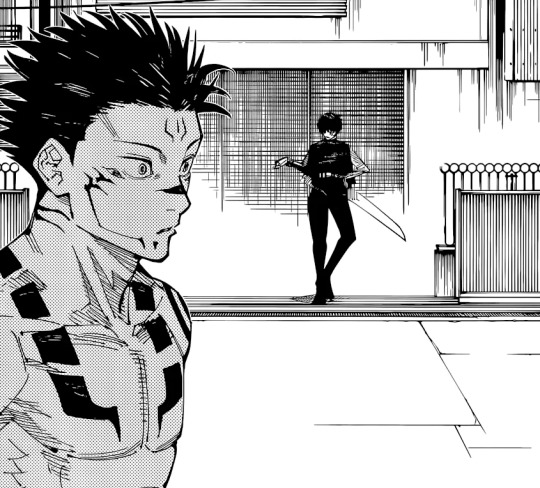
Maki Zen'in vs. Ryomen Sukuna
The past two weeks Maki has faced off against Sukuna. While it seems that Maki and Sukuna's face-off has followed the traditional formula of every individual Sukuna has squared up against so far. That being Sukuna fights them trying to bring out their best, praises them before swiftly defeating them. It's followed the formula so far, with Gojo, Kashimo, Higuruma, and Yuta. Yuta surveys their "taste" as unique sorcerers, and then quickly consumes them.
However, I am going to argue that there's a reason Sukuna takes a special interest in Maki that differs from Gojo Kashimo, Higuruma and Yuta and it's because the two of them foil each other.
1. Skin and Blood, Bone and Marrow
To badly quote Kant, and Johane Fichte thesis and anti-thesis are both necessary in order to make a statement.
Immanuel Kant's Critique of Pure Reason (1781) created the thesis / antithesis dyad, within two statements.
Thesis: "The world had a beginning in time, and is limited in regars to space."
Antithesis: "The world has no beginning and no limits in space, but is infinite, in respect to both time and space."
Fichte turned this dyad into a triad. A set of two contradictory ideas that is resolved with a third statement, synthesis. In order to make of synthesize a new idea, thesis and anti-thesis must meet first.
Are synthetic judgements a priori (before / precending) possible?
No synthesis is possible without a preceding anti-thesis . As little as antithesis without synthesis, or synthesis without anti-thesis, is possible; just as both cannot be born without thesis.
In other words no idea cannot exist without the opposite idea, and no new statements / judgement can be made without exploring these two ideas in opposition to one another.
I spent so much time explaining this philosophical concept because fights in Jujutsu Kaisen aren't just excuses for Akutami Gege to add more elaborate rules to the power system, and give the power-scaling bros more material to argue about. They are a clash of ideals between the two characters fighting, oftentimes with both characters embodying opposite philosophies. At this point it's not subtext, but literally text, Sukuna calls fights a clash of ideals.

Sukuna is not just fighting to physically conquer Yuji, at this point he wants to win in a clash of ideas to, he wants to disprove the ideals Yuji carries in his heart and all that he represents.
Mahito too, all the way back in Shibuya, called his fight with Yuji a clash of truths, rather than the fight between good and evil that Yuji imagined it to be.
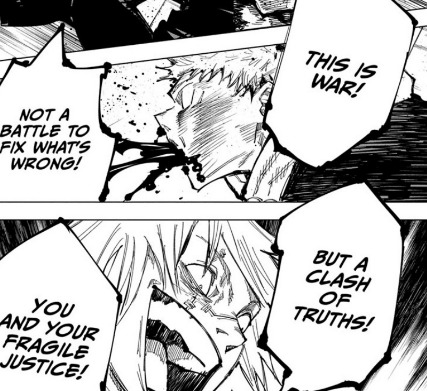
Thesis and Anti-thesis are both necessary to make a statement. Yuji cannot prove his ideals to be true, without clashing with Sukuna first, and the same for Sukuna, Sukuna can no longer disprove Yuji's ideals as false without recognizing his ideals and fighting them head on.
There's a statement on twitter I want to steal that summarizes the matchup of every mini-arc in the Sukuna fighting arc so far.

To summarize Lmfalolawholebunchanumbers point, Mahito and Sukuna acting as antagonists challenge the ideals of the protagonists, but while Mahito represents the reverse of humanity's ideals, Sukuna is against the concept of hodling onto any consistent ideology himself. Sukuna in fact believes that all the ideals of the sorcerers that challenged him in the past were false and flimsy, and is troubled by the fact that Yuji holds onto his ideals no matter what.
I already somewhat explored this in this meta, Sukuna's Anti-Enlightement. Where I argue that Sukuna's ideals resemble nihilism, but even then I wouldn't label Sukuna a nihilist because Nihilism is still a set of beliefs and Sukuna doesn't seem to hold onto any consistent ideology or belief system at all. Trying to assign any human branch of thought or motivation to Sukuna doesn't quite work, because Sukuna's point of view isn't one of a human, but more like an inhuman curse, or even a deity. In other words a calamity.

"Whoever fights monsters should see to it that in the process he does not become a monster. And if you gaze long enough into an abyss, the abyss will gaze back into you.”
Beyond Good and Evil Part IV Frederick Nietzsche
Nietzsche used the abyss as a metaphor to summarize the unknowable psychological complexity of human beings. You stare at the abyss trying to comprehend it. Which means when facing the abyss, the abyss forms in your mind. Anyone who tries to understand humans must face the fact they are incomprehensible. Anyone who tries to create some meaning to life must confront the fact that the world is so ridiculously overcomplicated and random it's impossible for the human mind to fully comprehend.
The abyss as it exists is a place of danger where it's easy to lose sight of your search for meaning, or even yourself, but in order to grow you have to confront the deepest, darkest part
Anyone who tries searching for the truth, risks confronting the idea that they may be wrong, risks questioning their values, risks confronting the fact that what they believed meaningful might have no meaning at all - and therefore the abyss widens inside of them, they might abandon idealism all together.
Anyway, enough boring philosophy more or less every single person who fights Sukuna risks having their ideas feel false. Or to paraphrase the twitter user I quoted above, most of the characters that try projecting their own human ideals onto Sukuna, find not only do they misunderstand Sukuna entirely, but Sukuna doesn't care about their ideals and disproves them.
Gojo and Kashimo (and before them Yorozu) all try to fight Sukuna, believing they could make Sukuna understand them and understand Sukuna in turn only to find they were misreading Sukuna entirely.

Gojo makes a big deal of trying to bring out Sukuna's best to prove that Sukuna is not alone standing on the top, only to be met with Sukuna basically going "I don't really care."

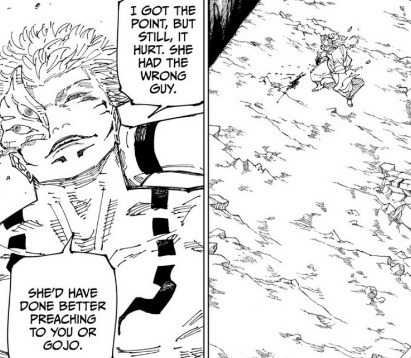
When you confront the abyss, the abyss opens up inside of yourself and your ideas may prove to be false. No one who's faced Sukuna so far, has been able to conquer that abyss, in fact Sukuna keeps rendering their ideals to be false. Perhaps because they are just projecting ideas onto the abyss, looking at Sukuna instead of looking at the abyss inside of themselves.
They want something from Sukuna that Sukuna can't give them, they're looking externally for Sukuna to give them easy answers instead of looking internally. Not one of them is able to form a new idea or make a statement because they're not willing to confront anti-thesis.
The exception to this pattern so far is Maki. There's a reason I've been hammering on about the abyss so much, it's because in this most recent chapter Sukuna calls Maki "a true void."
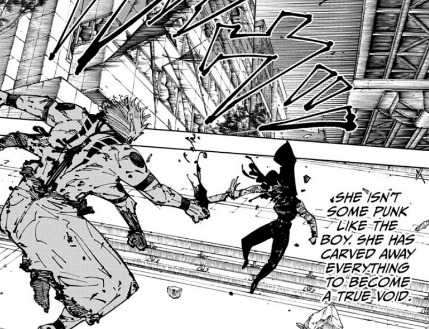
In one sense, there's the technical power system reason why he calls Maki a void. Maki is someone who gave up all cursed energy in order to strengthen her physical body, whereas in comparison Yuji who also mainly fights with his body and super strength, but unlike Maki, Yuji hasn't broken away from cursed energy and is instead soaked in Sukuna's cursed energy.
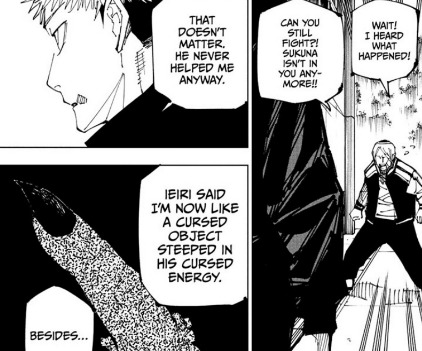
However, not only has Maki cast off cursed energy, unlike Yuji who has suppressed his own identity to become a cog in favor of his ideal of having a role and supporting other people, Maki has let go of the idea of protecting others and instead focused entirely on the idea of improving her own strength.
Though, not entirely by choice as Mai sacrificed herself, but Maki's awakening and becoming of herself happened when she let go of Mai, and protecting Mai or reforming the Zen'in for Mai's sake. Not only did Mai take cursed energy with her when she died allowing Maki to break free of cursed energy, but she also let go of her ideal of protecting Mai. Losing her cursed energy went hand in hand with losing her "goal" and almost immediately afterwards she loses her goal of trying to prove herself to the Zen'in or become clan head and just exterminates them entirely.
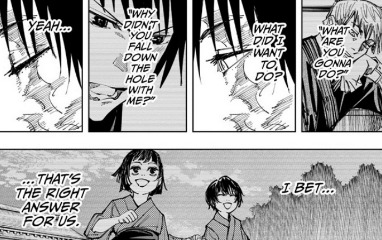
Everything Maki lived for is gone, so what does Maki live for now? Herself mainly, and the concept of total freedom that comes with no longer tying yourself to others.
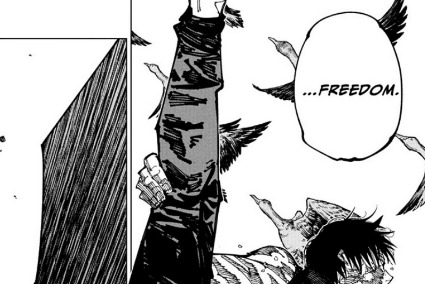
In that way, I'd say that Maki almost resembles Sukuna the most, because if Sukuna represents the void that others must confront Maki is the only character that has opened up the void inside of herself. As Sukuna said unlike Yuji who's half-assed in his idealism, Maki's shaved away everything and is contemplatng the void. Almost to reflect this, Gege's done away with most of Maki's internal narration and most of her internal dialogue is focused on either how to win, and how to bring out the fullest of her abilities.
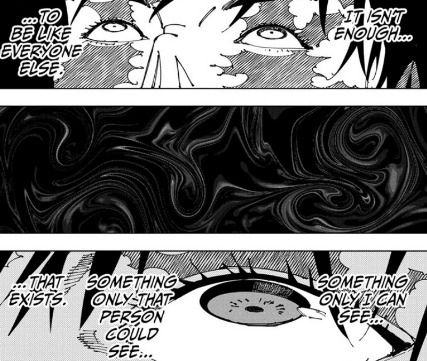
Maki's opened up and contemplated the void inside herself, and in that way she's done away with self-doubt like most of the characters are facing, she's not projecting her anxieties onto Sukuna or wishing for him to answer or resolve her identity crisis like Gojo and Kashimo. She doesn't even have an identity crisis.
In fact, Maki and Sukuna resemble each other so much by both having a void inside of them it makes me wonder if Twin Theory is true that Sukuna also achieved his perfection in Jujutsu by either fusing with his twin in Uterus or cannibalizing his twin somehow.
Even in the fight itself, Maki's the one who's most laser focused on winning, whereas Yuji and Yuta's strategies fail because they're too concerned with saving Megumi who himself at the moment does not wish to be saved. (Saving Megumi is a good thing though, I'm just making a point that Maki much like Sukuna only sees herself winning the fight and prioritizes that above everything else. It's not like she's against saving Megumi either she didn't argue against Yuta and Yuji taking a shot at it). It's just she's the only one who like Sukuna only sees the fight in front of her and doesn't worry about other people. She's laser focused on the win is what I'm saying).
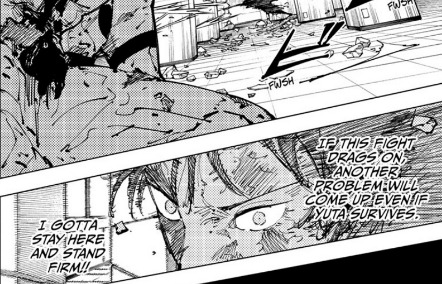
I don't think it's just the fact that Maki has cast away cursed energy that's drawn Sukuna's attention, but the fact that while she represents his anti-thesis focusing on only strengthening the human body, they also share many similarities between them.
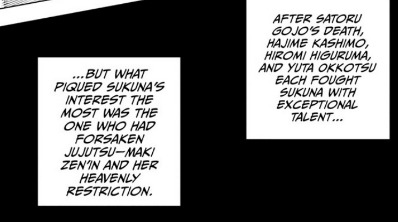
They're both the void.
Sukuna even says that Maki's existence denies Jujutsu itself.
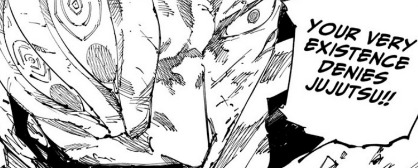
Sukuna says that Maki is the only person who's forced him to have a role, and in a way that's true, because by denying Jujutsu, she represents the void that Sukuna has to contemplate now. In a way she's played an uno-reverse card to Sukuna's philosophy of revolving his entire life around strengthening Jujutsu and being the height of Jujutsu.
Sukuna now has to prove Jujutsu's superiority and contemplate the fact that is ideal might in fact be wrong.
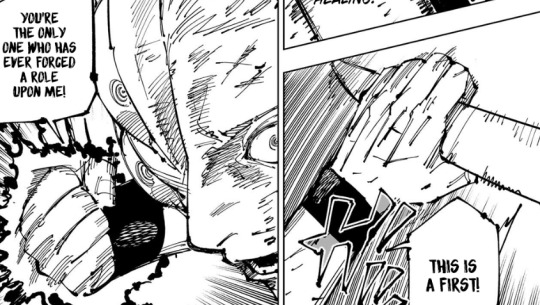
Sukuna and Maki both represent the ideal of what one can achieve in the pursuit of strengthening the body, versus strengthening Jujutsu, Hajime even comments that Sukuna's body is absolute perfection.

Not only that, but they both represent the opposing philosophies established by Kenjaku and Yuki, Kenjaku sees the future evolution of humanity as optimizing cursed energy, and Yuki envisions a future of breaking away from cursed energy entirely and even namedropped Toji and Maki both as examples of those ideals.
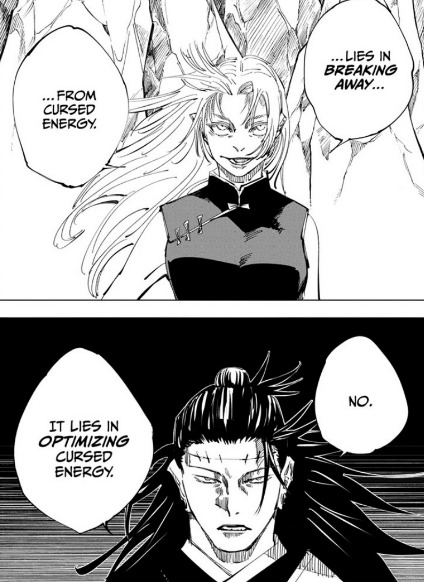
There's a reason that Gojo is troubled by Toji and remembers his loss to Toji years after the fact, Toji deeply troubles Gojo not because he beat him in a fight and caught him off guard but also because his existence challenged everything Gojo believed to be true.
Gojo is the first inheritor of the six-eyes, and Limitless in hundreds of years, he exists solely for Jujutsu as Nanami said, he was also someone who was arrogant at seventeen and was handed everything at birth, who has always been held up on a pedestal by Jujutsu Society. Yet the only person who seriously challenged Gojo and forced him to evolve before Sukuna rolled around was Toji, someone who is the scapegoat of Jujutsu Society, and who is looked down upon by the the three clans. Suddenly, the inherent superiority that Gojo believed in, all the things he thought made him great b/c he was the peak of the Jujutsu world was called into question if a mere monkey could challenge him.

Toji too, stuck around and fought Gojo because he felt a pressing need to disprove the philosophies and ideals that Gojo represented. However, Toji in this fight lost because he succumbed to the void.

He deviated away from his set of ideals and fell prey to his inferiority complex rather than staying true to himself in face of the void.
Gojo's enlightenment itself comes from facing the void that is Toji Zen'in, and then conquering that void by conquering his own biases against Toji that made him let his guard down. Yet, his defeat against Sukuna comes from the fact that he couldn't conquer the void, he couldn't find his own answers instead relying on Sukuna for an answer and because of that Sukuna reduced him back to a human being again with the world cutting slash that cut through the infinity.
In other words in just two chapters Maki vs. Sukuna have embodied a philosophical battle that has been raging in Jujutsu Kaisen since basically Hidden Inventory, and maybe even the beginning of the manga itself and it is what do your ideals, the ideas you live for mean in face of the void / death. Are they worth holding onto, can you create a synthesis from confronting and overcoming your antithesis, or will you too succumb to the meaninglessness that Sukuna represents?
How do you find meaning in a world where death is random, where anyone can die at any moment, a world that is inherently unfair where good things happen to bad people, and selfish monsters like Sukuna get whatever they want who win because they are selfish and step all over people and take what they want.
Confronting Sukuna means confronting the fact that the world may be empty, and we may all be just killing time until we die.

The lines skin and blood, bone and marrow which is what Sukuna uses to refer to the source of is strength (Jujutsu) and the source of Maki's strength (the physical body) are a reference to Bodirahma asking his disciples to understand his teachings.
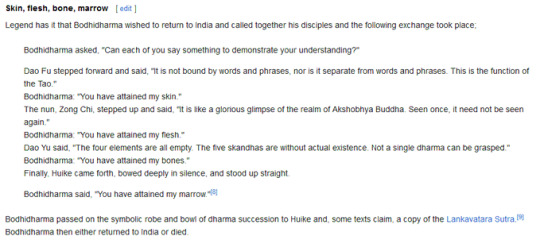
"You have attained my skin. You have attained my flesh. You have attained my bones. You have attained my marrow."
In other words neither Sukuna and Maki are entirely right, the true understanding comes not from Jujutsu, or the Body, but from both, from skin, flesh, bones and marrow.
In other words, a statement requires thesis and anti-thesis. It's not Maki and Sukuna that are right, and something can be learned from the clash of their ideals.
What I'm saying is basically that JUJUTSU KAISEN is a story with THEMES and I love it.
#maki zenin#ryomen sukuna#yuji itadori#satoru gojo#jjk meta#sukuna#maki zen'in#jujutsu kaisen meta#jujutsu kaisen theory
119 notes
·
View notes
Note
honestly I'm more at a loss when people say sylki is canon. I am...very confused by what people mean by that. they were never anything romantic together? I honestly feel like I've missed a whole season of the show when that gets said. that's not from a shipping standpoint; that's from nothing happening that'd make them "canon"
like, to ship sylki is still to ship something that isn't and didn't become "canon". it's still wanting something that didn't happen between them
like, even if sylvie was an intended "love interest" (was she? even? on the basis of her being a woman that loki connects with?), I don't call that alone a romantic relationship between them being "canon". Like, if elizabeth bennet and mr darcy never became anything, they're not "canon". that's just something that could have been but wasn't.
they were never actually anything?
LET'S TALK ABOUT "CANON" & BISEXUAL REPRESENTATION, THE SERIES' MIDPOINT & THE THEME OF BETRAYAL, AND THE SUBJECTIVITY OF ROMANCE
I've been sitting on this inbox comment/ask for a long time because I wanted to make sure I respond in a way that feels productive, kind, and doesn't step on other fans' joy. Having said that, as a Lokius shipper, I think it's really important for Lokius shippers and Sylki shippers to unite on at least one subject and that's positive bisexual representation. This isn't meant to be a harsh reply--I understand what the anon is saying from their point of view--but I also want to delineate between canon and personal interpretation/taste.
I also want to note that it's unfair to disavow Mobius and Sylvie's impact on Loki, Loki's impact on each of them as a result of his individual relationships with them, and thus the impact Mobius and Sylvie have on one another separate from Loki. Doing so really halves the overall richness of the story, and taking this into account is why my metas are so annoyingly long. This one, in particular, is a mess but hopefully I've managed to wrangle it into some kind of coherence that addresses the anon ask that is respectful to Sylki. Fear not, Lokius shippers, I discuss Lokius in this post, too. But first, let's talk about canon and bisexual representation ...
CANON AND BISEXUAL REPRESENTATION
Canon is often defined as: 1.) what is actually written in text (as opposed to subtext), AND 2.) what the creator(s) verbally confirm.
I've said before and I'll keep repeating: the most important aspect of art is art's relationship with the reader/viewer. Individual interpretation is what escalates a medium to a deeply personal and, at times, spiritual level. Art is supposed to make us think and feel. We're supposed to interact with it and do with it what we will. This is particularly important when we consider that much of consumable art is hampered by the demands of capitalism. Fan-interpretation democratizes what people without power want to see and hear, whereas canon (especially mass media canon) often self-censures to sell to the widest audience.
From the creators' standpoint, Sylvie has always been intended to be Loki's romantic interest, and Loki was always intended to have romantic feelings for her. This is what the creators tell us. Whether or not one likes Sylvie and Loki together is subjective.
As for the text, the plot between Loki and Sylvie has the markers of a romance, albeit one that doesn't come into full fruition. By full fruition, I mean a happy ending with each character affirming one's love for the other and committing to being together. Now, a relationship doesn't have to be successful or reciprocal to be considered romantic. Heck, it can be absolutely toxic and still be romantic. Whether or not the plot is convincing in its execution of romance, however, is also subjective.
What romance requires is: 1.) at least one of the characters desiring the other, and 2.) at least one of the characters willing to sacrifice for the other. Sacrifices don't have to be big, either. They can be small and cumulative.
Canonically, Loki fulfills both of these romantic requirements for Sylvie. (More on Sylvie below).
Subtextually (that is, not canon as defined above), Loki and Mobius fulfill both of these requirements for one another.
I'm gonna soap box for the next two paragraphs, so you can skip over this if that's not your jam. Both romances, canonical and subtextual, can exist concurrently without erasing the existence of the other. Even if Loki and Mobius had miraculously become canon in S2 (it's Disney, this never would have happened but let's explore the hypothetical), that doesn't erase Loki's former romance with Sylvie in S1. To erase that history is bisexual erasure, which isn't okay. Likewise, quashing the importance of queer subtext in order to "kill the other ship" isn't okay either, as it reinforces optical heteronormative romance in mass media and is also a form of bisexual erasure.
What's more important than either ship "winning" is the positive portrayal of a bisexual character. This means a character who demonstrates genuine love and devotion to people of more than one gender. If we accept the canon AND the subtext (we don't have to like it; Sylki's not my cup of tea personally, but I accept it as real), Loki fulfills positive bisexual representation, however restrained that representation may be. The social goal is to get to the point where a media juggernaut like Disney allows its franchise characters to experience relationships with more than one gender canonically and positively. We're not there yet and I'll probably be dead before Disney ever gets there, but Loki can be seen as a historical stepping stone distinct from Aziraphale and Crowley (Good Omens) and Steve Bonnet and Edward Teach (Our Flag Means Death).
(NOTE: Polyamory is a whole separate subject matter, which I'm won't get into here.)
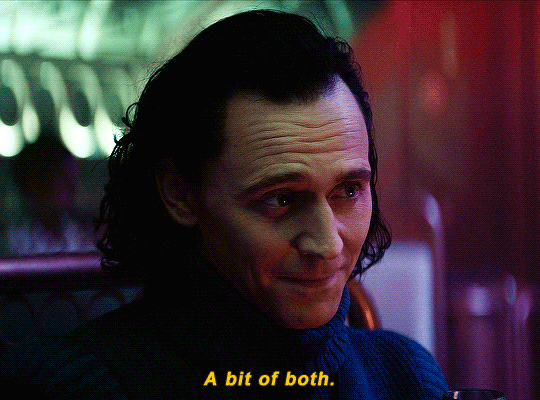
ON SYLVIE
There's fan dispute over Sylvie's interest in Loki. I've previously written meta on Sylvie's sexuality and how she responds to Loki's romantic advances here. In S1, while she starts off frustrated, I think Sylvie slowly develops interest and was cautiously hopeful that she and Loki could figure out their futures together. Loki has been consistent about wanting to be with Sylvie and supporting her up until the necessary plot conflict of the series midpoint (S1E6; the S1 finale). This midpoint is the root cause for why Loki and Sylvie's relationship becomes strained. Again, this doesn't mean that the romance never existed--the plotpoints are there--but it does mean Loki's character development got in the way.
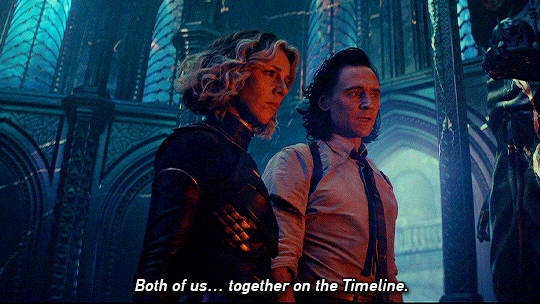
So let's talk about the series' midpoint and the interplay of Mobius, Loki, and Sylvie's mutual impact. The three are so deeply entangled that it's worth untangling their cause and effect on one another.
THE SERIES' MIDPOINT & THE THEME OF BETRAYAL
I keep stressing in my other metas that the series' midpoint (S1E6) is the most critical. Structurally, midpoints are where the story turns. Midpoints occur on multiple scales: at the episode level (typically in acts 3 or 5, depending on how the screenwriter divides their screenplay), at the season level, and at the series level. Midpoints are what provide the overall narrative and character arcs with movement.
As a whole, there are 3 key midpoints in the entire series:
1.) S1E2/E3 - When Loki betrays Mobius for Sylvie (midpoint of S1)
2.) S1E6 - When Loki betrays Sylvie for the "bigger picture" (midpoint of the whole series)
3.) S2E3/E4 - When it's revealed HWR betrayed Renslayer; Victory Timely is brought into the mix, and Sylvie reluctantly joins the TVA (midpoint of S2)
There is another betrayal that runs near-concurrently with #2, which is Mobius's betrayal of Renslayer (it begins in S1E4 and continues into the S1 finale). Thematically, we can take Loki's betrayal of Sylvie and Mobius's betrayal of Renslayer as mirrors of one another because these are the only betrayals that are motivated by good rather than selfishness. The selfish betrayals of #1 and #3 bookend betrayal #2 to highlight the beginning Loki's readiness to become a hero in S1E6. Where S1 focuses on Loki exploring who he is, S2 focuses on the hero Loki will become. S1E6 therefore serves as Loki's turn, his launching point to get to where he lands in S2E6. The story is really well-structured!
The poetic irony is that Loki's S1E6 betrayal was not an act of villainy, but an act of character growth.
There is plot set-up for Loki's betrayal of Sylvie, and that set-up is 2-pronged: 1.) from Sylvie's end, her misinterpretation of Loki's intentions, and 2.) from Mobius's end, the provision of unconditional friendship. Building up to these prongs are S1E1 - S1E3, in which Loki's self-interest and impulsivity are emphasized. S1E4 pivots Loki from self-interest and impulsivity to consideration for others and caution. Sylvie did not bear witness to Loki and Mobius's interactions in S1E1-S1E2 and S1E4 in the time loop chamber. She has no context for why Loki would hesitate killing HWR. I'll discuss this more under "Prong 2".
PRONG 1: SYLVIE'S MISINTERPRETATION
In the scene below (S1E5), Sylvie makes an assumption about what Loki wants and Loki admits via subtext that ruling a timeline actually won't make him happy.

Sylvie smiles in response, implying she understands what Loki means, however Loki often speaks in double-meanings (he cannot be trusted) and Sylvie has doubts (she cannot trust). From Sylvie's point-of-view, Loki has discussed the desire to rule with her 3 times (writers' magic 3s again). Above is the third. The previous 2 are:
1.) In their first confrontation in S1E2, when Loki offers Sylvie the opportunity to be his lieutenant. (Can't find the gif of this. Grr ...)
2.) On Lamentis (S1E3) in the scene below:
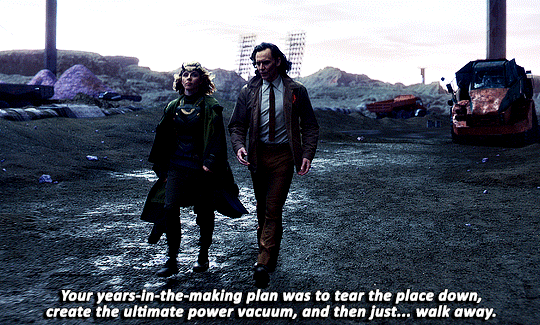
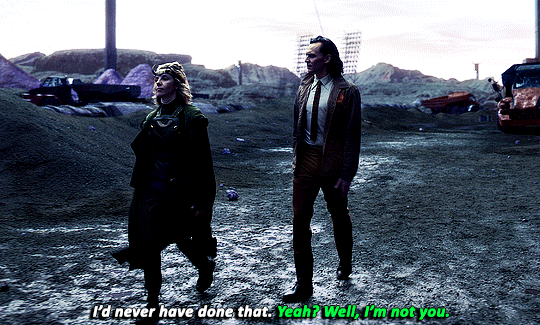
By S1E6, Loki has no interest in rule.

He's honest when he says he's worried about the greater ramifications of killing HWR. Sylvie doesn't believe him. The question is how did Loki arrive at this point in his character arc? Why slow down now? Why worry about the consequences now?
The answer is in S1E4.
PRONG 2: MOBIUS'S UNCONDITIONAL FRIENDSHIP
It's established in S1E1 that Mobius knows Loki better than Loki knows himself and consequently better than Sylvie knows Loki. A lot of Mobius-haters despise Mobius's cold confrontational tactics but it is those same tactics that force Loki to self-reflect. And to be clear, Mobius uses cruelty in S1E1 because 2012 Loki would not believe in, let alone listen to, softness and compassion. Cruelty is a language 2012 Loki understands, therefore Mobius communicates with him on that level to get him to listen and start thinking about the answers to the hard questions.
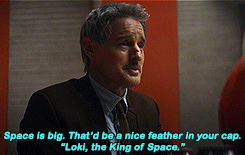
Not exactly the gif I wanted, but close enough. In this scene, Mobius wonders why Loki, who "has so much range", wants a throne. He then asks Loki, what's next? The implication of these questions is that Mobius knows Loki will never be satisfied. He knows, deep down, a throne is a poor substitute for what Loki really wants: love, acceptance, and companionship.
Mobius's tone is mocking, his note that Loki has a wide range is complimentary, and the question is serious. Further, and this important, Mobius gives Loki respect in conjunction with his cruelty, his compliments, and his seriousness by acknowledging Loki's intelligence ("I am smart"; "I know") and his potential to be more than a villain ("That's not how I see it"). Understandably, this strange, dizzying mix of seemingly contradictory truths puts Loki off-balance.
Their tenuous allyship becomes a friendship in Mobius's eyes near the end of S1E2. Mobius is practically squeeing about Loki's multiple breakthroughs and how well they work together to Renslayer:
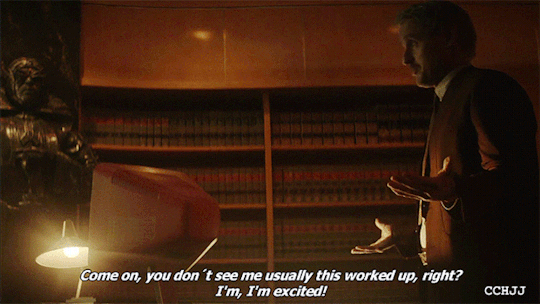
And Loki genuinely looks excited to help Mobius. Look at that fist-pump. Mobius doesn't see it, he's ahead of Loki, so his enthusiasm isn't an act. The seeds of mutual trust (rather than doubt) have been planted.
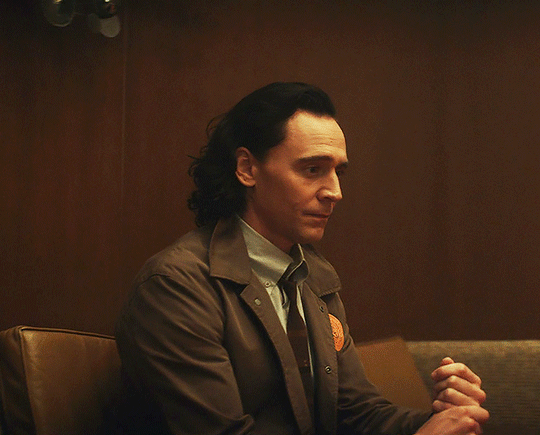
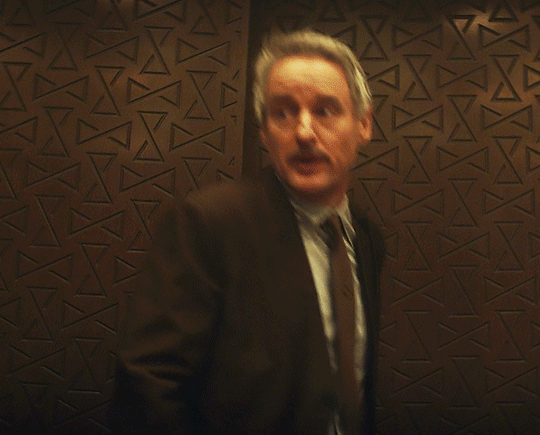
Unfortunately, Loki's poor impulse control and need to hedge his bets out of self-interest lead him to betraying Mobius. Both Sylvie and Mobius take Loki's betrayals poorly.
The key difference is that Mobius cannot resist the desire to trust Loki, to want to be his friend. This desire creates Mobius's doubt in Renslayer, which in turn leads to his betrayal of her.
Forgiveness isn't easy. It requires the ability to accept disagreements and another person's shortcomings. It requires good will, faith, and a willingness to move on. It requires compromise and, at times, letting go entirely.
Mobius torturing Loki with the Sif memory loop was awful. His personal hurt is directly tied to the below admission, which informs Loki what Mobius thought of their relationship:
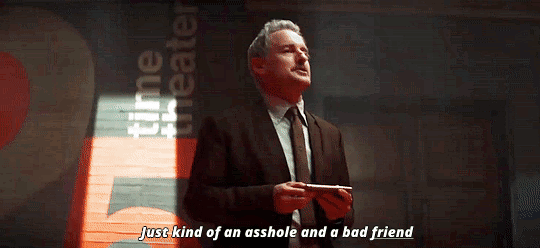
And that revelation startles him. It forces him to evaluate his actions that led to Mobius saying such a thing (impulsivity; self-interest). Loki, who doesn't want to be alone, desires Mobius's friendship.
So when Mobius returns to Loki with an olive branch ...

Loki offers Mobius an olive branch of his own by affirming the friendship Mobius believed in but felt betrayed by.
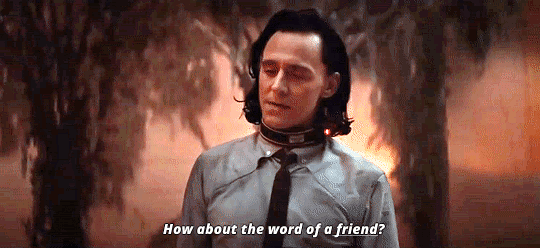
Thus, Loki and Mobius accept each other's olive branches. They forgive each other and repair their relationship from there. This is critical thematically because Loki and Mobius each extend olive branches to Sylvie and Renslayer respectively, both of whom reject those olive branches more than once. Sylvie and Renslayer represent opposite ends of the chaos versus order ideology, for which neither is willing to compromise. Loki and Mobius also start out at opposite ends before meeting in the middle.
Sylvie unfortunately does not know anything about Loki's interactions with Mobius and how those interactions have impacted Loki's motivations. She doesn't know that Loki wants to "slow down and think about this" because the last time he acted on impulse, it turned out he almost threw Mobius's friendship out the window without realizing he had his friendship in the first place.
For her, the seeds of doubt have already been planted: Loki betrayed the TVA to pursue her, Loki expressed shock at Sylvie's desire to "walk away" rather than taking advantage of the "ultimate power vacuum" once the TVA is destroyed, he expresses the desire to rule 3 times. Therefore, it's perfectly reasonable for Sylvie to assume Loki would betray her for power even though she had hopes to the contrary. Romantic tragedy? Absolutely. Believable? Depends on who you ask and what your personal taste is.
There must be some kind of sentiment on Sylvie's part, however, because she chooses not to kill Loki. Instead, she kisses him goodbye and throws him through a time door.
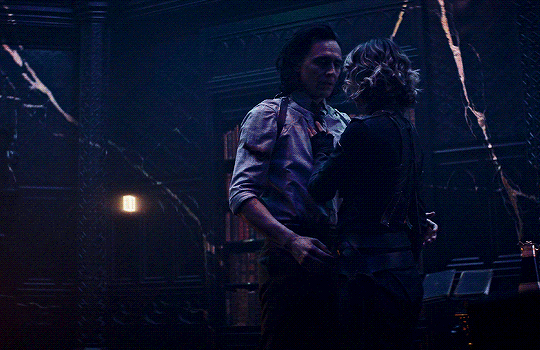
Mobius's friendship is therefore the catalyst for everything that unravels between Loki and Sylvie in S1E6 (the series' midpoint). I think it's safe to interpret Sylvie's tearing into Mobius in S2E4 as not only due to being in the TVA and having all her traumas brought to the surface, but also due to experiencing jealousy. This level of anger matches Mobius's outrage about Sylvie in S1E4! Note, however, that this interpretation of Sylvie's interaction with Mobius is subtext. Subtext goes many ways!
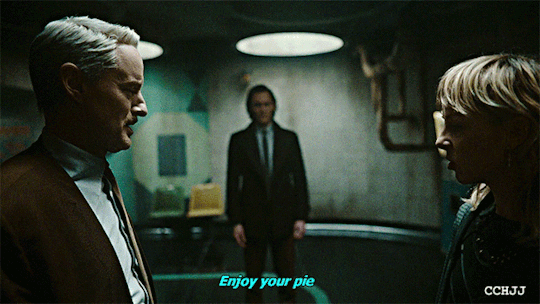
THE SUBJECTIVITY OF ROMANCE
Are Loki and Sylvie a believable romance? It depends on your taste.
A fictional couple's overall successful reception by the audience (which is rarely if ever 100%) is contingent on a few things:
1.) Character development
2.) Story execution
3.) Chemistry between the actors
Reception and interpretation of the above are all subjective. In addition to these elements, another important factor is couple trope. Depending on your preference, some tropes might be nope while others are yum. You might even like most tropes but the actor chemistry, character development, and/or plot are just not doing it for you.
Loki and Mobius follow the tropes of:
Opposites attract/Complementary set
Sunshine and cynic
Enemies to allies to friends to lovers
Sherlock and Watson
Slow burn
Ride or Die
Loki and Sylvie, on the other hand, follow the tropes of:
Exceptionally similar but with key differences/Matching Set
BAMF duo
Enemies to allies to lovers
Bonnie and Clyde
Fast and passionate
Ride or Die
Loki and Sylvie's romantic dynamic may be compared to the following couples in other media:
Batman and Catwoman
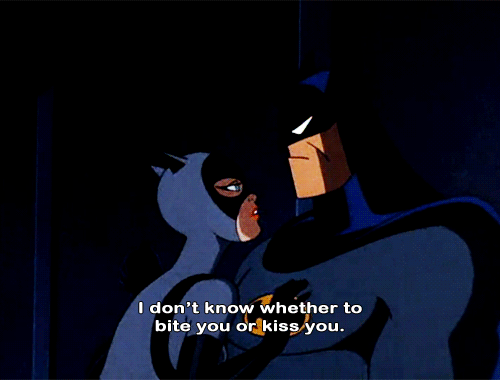
Jack Sparrow and Angelica Teach

Benedict and Beatrice

If you notice, they all have very similar personality traits. They also fight and fight a LOT. It's part of their charm and can add to their chemistry.
Personally, I didn't feel any chemistry between Loki and Sylvie, I didn't feel like there was enough warmth between them, and I really wanted Loki to be loved by someone who makes an effort to understand him rather understanding his core traits off the bat by being the same entity. Loki and Mobius hit all the right story beats for me. Tom and Owen's chemistry as actors is remarkable. I'm also a sucker for ball of sunshine and cynic dynamics.
But that's just me. That doesn't mean I don't see what the creators tried to do with Loki and Sylvie in terms of plot, character development, and couple tropes. Some people felt chemistry between Tom and Sophia, others (like me) didn't. Whatever the case, the canon exists and the romantic tropes are there. I just feel the subtextual romance between Loki and Mobius is stronger and that, again, is my subjective judgment.
#loki#lokius#mobius#loki series#loki season 2#loki meta#my meta#asks#sylvie#loki analysis#my analysis
97 notes
·
View notes
Text
Chemical Weddings: White Knight
Here it comes my second short meta on RWBY's chemical weddings. It is White Knight's turn! Feel free to skip the introduction, if you have already read it in my previous post (or if you already know what a chemical wedding is)
WHAT IS A CHEMICAL WEDDING?
A chemical wedding is a motif used in alchemical stories (aka stories, with symbols related to alchemy). It is a metaphorical union between characters and it represents two opposites coming together. Think of it as a motif that comments on a relationship and describes how it changes throughout a narrative. It shows how two characters' bond develops and how they integrate qualities of each other. Even if it is called "wedding", the union doesn't necessarily have to be romantic, but often it is. Like in RWBY's case.
RWBY uses chemical weddings to develop romantic relationships. How does the series do it? This meta by @hamliet explains it perfectly:
It uses some alchemical imagery (like plates from alchemical texts as reference)
It employs elemental motifs (water, fire, air and earth), which are keys to alchemy
It integrates other symbolism, like romantic subtext or fairy tale references
Both hamliet and I have already talked about RWBY ships and chemical weddings, so this short meta is just a quick review of White Knight’s ones, with some integrations.
Here are Whiteknight's posts, that I am going to reference:
Weiss and Jaune's foiling throughout the series
White Knight and Arkos (+ Whiterose)
White Knight's scenes in volume 9
White Knight's chemical wedding 2.0 by hamliet
Now, let's dig into White Knight's two (for now) weddings.
WHITE KNIGHT'S WEDDINGS
White Knight's weddings make use of this imagery:

There is a Mercurius (entity representative of change), who unites a man and a woman through impaling one of the two.
This is what happens to Weiss and Jaune twice:
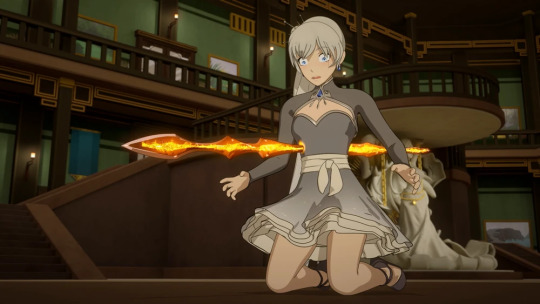
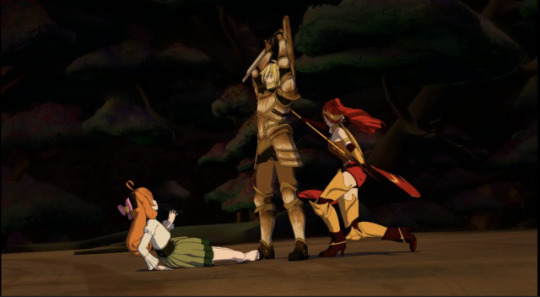
In Mistral Cinder impales Weiss and in the Ever After the Curious Cat impales Jaune. Not only that, but both Cinder and the Cat make sure Weiss and Jaune indirectly hurt each other.
Cinder takes Jaune's heroic remarks and uses them as an excuse to mortally wound Weiss:

The Cat tricks Weiss into physically hitting Jaune:
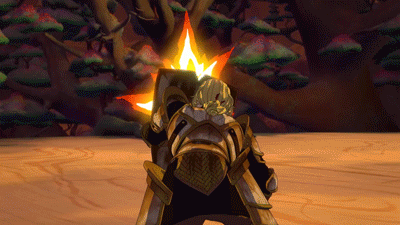
These parallelisms lead us to two considerations:
The two weddings are inversions: this isn't any news because in RWBY the second wedding is always an inversion of the first. Still, when it comes to White Knight, this inversion is particularly through and it ties with an important motif of theirs. Weiss and Jaune are strong mirrors of each other.
Cinder and the Cat (our two antagonistic Mercurius) force Jaune and Weiss into specific gender roles. Both mock Jaune (the knight) and use Weiss (the damsel). This isn't by accident and it ties with the archetype explored by White Knight, aka that of the Anima/Animus.
MIRROR MIRROR = ANIMA + ANIMUS
Weiss and Jaune's weddings mirror each other in multiple ways. Let's see how.
Weiss and Jaune's first wedding starts with Cinder impaling Weiss and leaving her to die. Jaune rushes by her side and activates his semblance to save her. The whole scene ties in their respective fairy tale symbolism. As a matter of fact Jaune performs a miracle as Jeanne. Weiss instead gets resurrected by the Prince and crowns herself Queen Snowhite through the Queen Lancer.
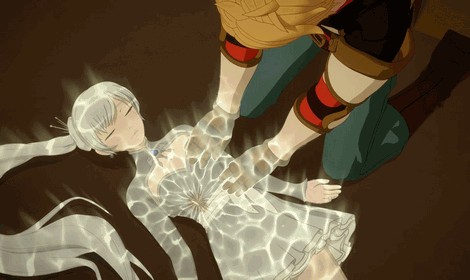
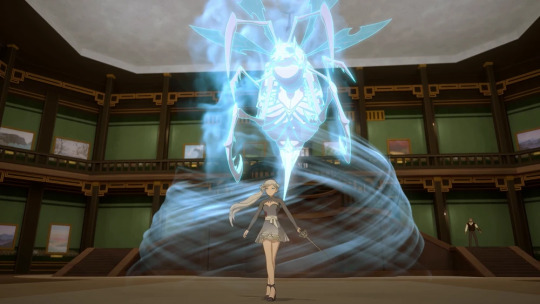
Weiss and Jaune's second wedding starts at the end of volume 8, when Cinder defeats them both and reiterates their trauma. She forces Jaune to kill a maiden and targets Weiss to hurt Winter. She is also the reason why Weiss and Jaune end up together in the Ever After, where their wedding reaches its climax. In this magical world, Weiss guides Jaune towards self-realization and metaphorically has him fall, so that he can integrate Alyx and resurrect. Their interaction in volume 9 references another alchemical text, knowns as the Splendor Solis. Specifically, it alludes to this plate:

This plate has:
2 miners excavating a hill (a metaphor for making the stone from the prima materia). It is important that the two characters wear respectively a golden and a silver robe, which call back to the Sun and Moon
The Sun and Moon mirroring each other. The Sun is in the sky (air) and the Moon is in the river (water). They are opposites balancing each other
Eshter's story pictured in the frame of the pedestal. Eshter is a biblical character and the second wife of King Ahasuerus, who is determined to kill the Jews. Still, Eshter (a Jews herself) steps in, touches the King's staff and convinces him to let her people live
The plate's theme is the beginning (prima materia) of a union (sun and moon) through communication (Eshter's parable).
It is referenced here:
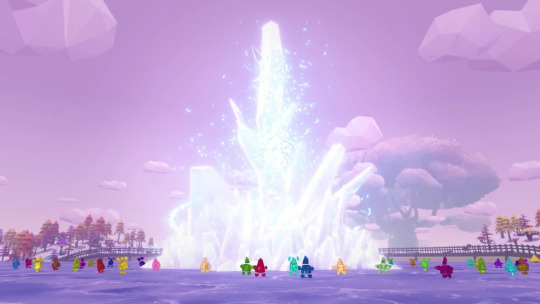
The Genial Gems create a giant white hill, which clearly alludes to the philosopher stone. Jaune and Weiss play the Solar King and the Lunar Queen:
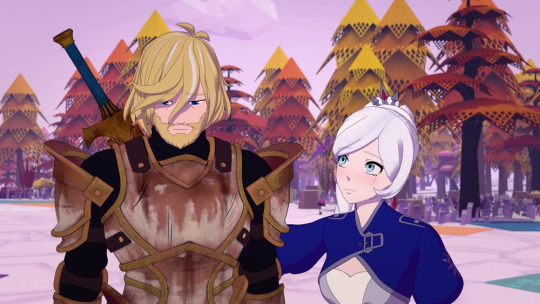
Jaune is linked to the sun and masculine (gold), while Weiss to the moon and feminine (silver). They grow closer thanks to empathy.
In particular, their interaction is an inversion of King Ahasuerus and Eshter's. In the biblical episode, the King wants to kill the Jews and Eshter stops him. In RWBY, Jaune doesn't want to let the Paper Pleasers ascend and Weiss tries to get through to him (together with BY):
Weiss: Then why do you care so much about this village?! Jaune: Because I can actually PROTECT these people!!
Just like Esther touches the King's staff, Weiss grabs Jaune's sword:
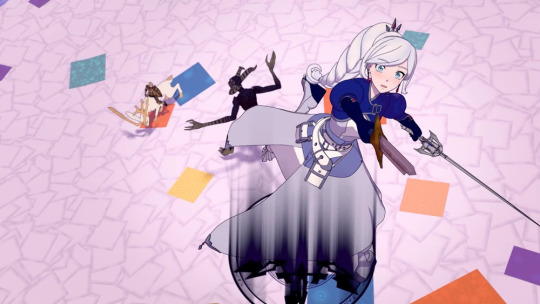
Eshter's gesture is a symbol of intimacy and connection. Similarly, using another person's weapon in RWBY shows closeness.
In short, both weddings are rich of symbolism, but the first focuses on the fairy tale allusion, whereas the second explores alchemical imagery. This isn't the only difference, though, as the two situations are perfect parallels/inversions of each other:
In Mistral, Cinder kills Weiss to hurt Jaune, whereas in Atlas, she forces Jaune to kill Penny. Moreover, both times she negates Weiss's agency and uses her as a pawn to hurt someone else (Jaune and Winter).
In Mistral, Jaune and Weiss go through a crisis together, but they emerge victorious. In Atlas/Ever After, Jaune and Weiss lose, but grow closer as they come to terms with this defeat.
In Mistral, Jaune hurts Weiss because of his psychological issues, but saves her physically. In the Ever After, Weiss saves Jaune psychologically, but hurts him physically. Both are responsible for the death and resurrection of the other.
In Mistral Jaune unlocks his semblance (changes spiritually), whereas in the Ever After he becomes young again (changes physically). Both in Mistral and in the Ever After Weiss ends the wedding by unlocking a new summon. She conjures the Queen Lancer in Mistral and the Nevermore in the Ever After.
In Mistral, Jaune is led by Pyrrha towards his ideal-self, whereas in the Ever After, he is led by Weiss towards his real-self. Symbolically, he goes through two stages of the anima integration. From Pyrrha/Mary (devotion and idealism) to Weiss/Sophia (understanding and reality).
In Mistral, the resurrected Weiss unlocks her Queen Lancer, which is key to fighting Hazel. In the Ever After, Jaune integrates Alyx and is reborn after a trial of fire. Once he comes back, he is key in defeating Neo and the Cat with his plan to separate them. Both do not "win" the conflict, but are instrumental to its solution (Weiss through heart and Jaune through mind).
In general, both times Jaune and Weiss make important steps to integrate their anima/animus, which their bond represents. The anima/animus is the feminine (anima) and the masculine (animus).
In Mistral:
Weiss integrates her animus and summons a Queen Lancer, an entity which is both queen (feminine) and knight (masculine)
Jaune integrates his anima (feminine) by discovering himself a healer (traditionally feminine quality)
In the Ever After:
Weiss integrates her animus by acting as Jaune's Knight. She summons her Knight while fighting side by side with him. Moreover, throughout the whole volume Weiss looks for someone who can guide her home. It turns out in the climax she herself is the guide, the knight, who leads Jaune and the others to the tree. As a matter of fact she is the one who teaches the others the theme of "acceptance".

Jaune integrates his anima by accepting he is no hero (no Knight) and by realizing Alyx is a part of himself. He faces her and integrates her spiritually (her vision in the smoke) and physically (her knife):

In volume 9, both Weiss and Jaune regress and go back to their stereotypical selves. Weiss is stuck as the damsel and Jaune rusts as the knight. However, they move on thanks to each other. They are reborn.
WHITE KNIGHT= REBIRTH
The focus of White Knight is rebirth (coagula). In Mistral they get a victory and in Atlas they get a loss. Still, both weddings climaxes in resurrections. Weiss is reborn in volume 5 and Jaune is reborn in volume 9. Not only that, but after White Knight's Ever After wedding Ruby herself is reborn:
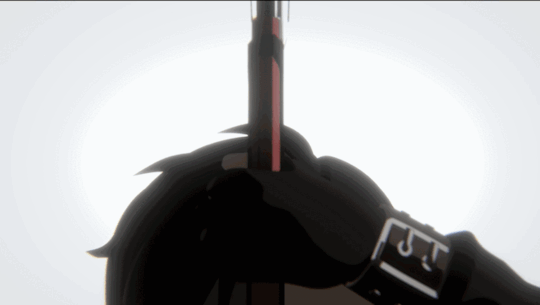
This renewal of the self is celebrated by a full Nevermore:

This marks White Knight's second wedding as their nevermore wedding, which has them overcome grief through love.
NEVERMORE
Weiss summons her full Nevermore in the finale. This Grimm is tied to both Ruby and Jaune.
It is symbolic of Ruby's rebirth, as it is the first Grimm team RWBY killed together and Ruby landed the final blow. Weiss is able to manifest it because by the end her team is whole again and Ruby is back.
It celebrates Jaune and Weiss's wedding, as our Lunar Queen conjures it after her interaction with Jaune. Their exchange is the pivotal moment for Weiss in volume 9, as she helps herself by helping Jaune. She teaches Jaune to forgive himself and learns to forgive herself at the same time. As a result, she unlocks this summoning, which is symbolic of the self:

Its glyph is in fact a mix of all the other ones, as Weiss is a sum of all her avatars.
Jaune too makes a decisive step towards the self:
Alyx: Maybe it’s time for a change, to be the kind of man you always wanted to be.
He accepts Alyx and gets a second chance to grow up as a result:
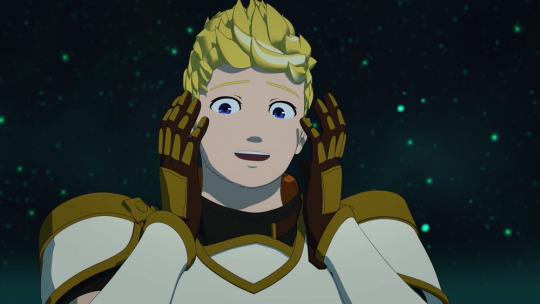
His new self has a white streak of hair to show he has successfully integrated with Weiss (white) and has obtained wisdom.
FROM UNCONSCIOUS TO CONSCIOUS
There is one final difference between White Knight's two weddings. The first has Weiss and Jaune's metaphorical union happen unconsciously. The second instead has this process become conscious. Let's consider this:
In Mistral Jaune instinctively activates his semblance and Weiss unconsciously unlocks her summon. Their actions happen because of internal and unconscious changes that are not elaborated on. They are quick transformations and the wedding itself is quick.
In the Ever After Weiss consciously encourages Jaune. By doing so both characters find a catharsis for their unconscious feelings. They make them conscious. Similarly, Jaune can consciously face Alyx and integrate with her. Weiss's own summoning is not quick and raw, but it is the result of a process that starts in volume 8 (when she fails to materialize the Grimm), goes on in the chess fight (she has the wings appear) and is finally complete at the end of volume 9 (the full Nevermore manifests itself). The wedding is also very slow and distributed throughout two volumes.
This choice makes sense, as Weiss and Jaune's dynamic is about them slowly realize who they are and who the other is. They have been each other's mirrors since the beginning and as they better understand themselves, they can better relate to the other and accept them.
#rwby#rwby chemical weddings#chemical weddings#white knight#weiss schnee#jaune arc#rwby meta#rwby alchemy
50 notes
·
View notes
Text
Original Script Analysis, Part 1: Kataang Is Better... And Also Worse.
I want to start this off by saying that when it comes to media analysis, I personally don’t tend to give authorial intent a significant amount of weight – at least, not by default. I understand why authorial intent is so often debated among media analysts, and why so many metas and critiques often hinge their arguments on paratextual information that serves to provide potential insight on what the authors were thinking or planning. But I myself tend to follow more of a “Death of the Author” framework. There are some exceptions, such as when I believe the author’s stated intent – or even details such as their background, life experiences, advocacy etc – has bled through their work so heavily that it becomes impossible to ignore its impact on the final product. (E.g., reading Fyodor Dostoyevsky compare murder to state-ordered execution, it is hard not to contextualise the passage with the knowledge that Dostoyevsky himself faced a firing squad and was given a pardon at the very last minute). Even then, I tend to treat paratextual information like – Understanding the context behind x scene or y narrative choice potentially adds a layer of meaning to it, particularly why some scenes may have been framed the way they were, or why the author chose to tell/expand/conclude the story like this instead of like that. I use paratextual information to deepen my understanding of the author’s reasonings behind their choices. I don’t use paratextual information to form my opinion on whether their choices were good.
(I prefer to form my own opinion on that, based on what I think of the text itself.)
That being said, like most of you readers I too had heard the many rumours surrounding the writing/production process behind ATLA, especially when it came to the ships. Which ship, if any, was planned for, when were the romance arcs finally decided, were there conflicts/disagreements between writers, were there script changes and animation edits to strengthen one pairing while weakening other, and so on and so on. I’d heard the rumour that The Southern Raiders went through multiple rewrites/changes, because it was originally “too shippy”. I’d heard the rumours that Aaron and Elizabeth were pro-Zutara, Bryan and Mike were pro-Kataang, and that their respective positions/opinions on these two pairings seep through their writing in an acutely perceptible way.
I’d also heard the counter-argument, the official narrative endorsed by the creators that any chemistry or subtext between Zuko and Katara was always intended to be platonic, and that readers who saw anything romantic between these two characters were simply setting themselves up for disappointment by projecting their own expectations or preferences onto the show, nothing more.
Over the past 15 years or so, these debates shaped much of the ATLA “shipping discourse”, sometimes even dominating discussion on the subject. I myself have gotten many a variant of “Zutara was never going to happen, get over it” – even when I’ve made a deliberate effort to omit any mention of authorial intent in my analyses, because, as I’ve said, I still don’t consider that kind of paratextual information relevant to my own opinions on why I think Zutara just works better. But given the intensity of the arguments surrounding behind-the-scenes shenanigans, their impact on the final product, and even their supposed significance in determining shipping validity, it was impossible not to wonder at the truth behind all these conflicting rumours.
So when I set foot in the WGF, it was admittedly difficult to contain my bubbling excitement and anticipation. Even still, I resolved to keep my expectations low. Rumours are rumours, after all. Secondary sources must always be taken with a healthy grain of salt, and some of the rumours weren’t even second-hand information at that. And I already knew that no matter what I found, my own opinion that Zutara is the best love story almost written, would not change.
All that said and done, let’s just say that I found the discovery... highly rewarding, and for those of you who have spent years refusing to accept that you were just “reading into things”, I hope my findings bring you some long-awaited vindication.
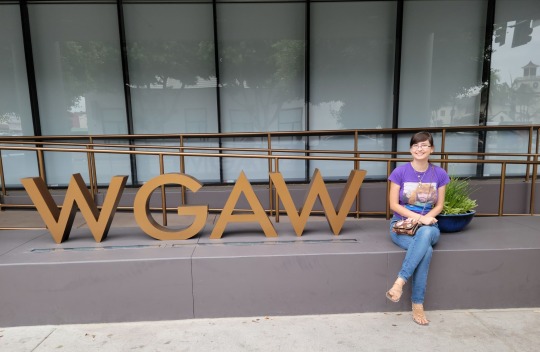

There are two other disclaimers I need to get through before we continue:
1) The Writers Guild Foundation is not a lending library. You may make an appointment to view the scripts in person, and you are allowed to take notes and manually copy as much as you like. But you will not find copies of their scripts online, and photos and screenshots are strictly prohibited. From what I understand it’s a copyright issue. Legally I’m fairly certain that embedding photos in this post and accompanying it with critique and analysis would/should count as “Fair Use”; however, I know that at some point I’d like to be able to return to the library, and I don’t want to risk being blacklisted for not following their rules.
As such, all the images embedded in this post are reproductions of snippets that I had to manually copy and type up, word for word. It was slow work, so as much as I’d love to be able to just plop the entire script of The Southern Raiders (or any ATLA episode) here for you to read, I had to narrow my focus a fair bit. I mainly noted down, in order of significance:
additions, omissions or changes in the original script compared to the show
bits where the writer’s notes/storyboard directions contained insights or descriptions that I found interesting, surprising, or just plain funny
scenes that weren’t really all that different or unexpected, but we love to see it in writing anyway (ahem Crossroads of Destiny *cough*)
I’m sure there’s a lot that I still managed to miss - even visiting over two days, I couldn’t read every episode. I highly encourage Zutarians living in or near LA to make an appointment and read the scripts for yourselves. You’ll be able to see more than what I’ve posted here, and you might even unearth some goodies that escaped my notice.
(Credit goes to @lady-of-bath for taking my boatload of notes and reformatting them to look like scripts again ❤)
(Also apologies that some passages are split across two images; that just means they were long enough that they spanned two pages and I couldn’t be bothered splicing them back together so I just embedded them here as separate image files. I promise I didn’t cut/remove anything; images not separated by a line of dashes should be read as one continuous snippet 😊).
2) The second thing I ought to clarify is that, from my understanding, the drafts I read were final drafts. These were scripts submitted to the guild just prior to storyboarding, voice acting, animating etc. As I read them, I noticed that the only changes to the script that I could tell were non-dialogue related - so things like, descriptions of the characters’ actions, movements, facial expressions/body language, what you can or can’t see in the shot, etc. Otherwise, voice lines have been essentially kept intact. This suggests to me that the changes made to the script after submission to the guild, were also made after lines had been recorded, possibly even after scenes had been storyboarded. It also suggests that the scripts the voice actors read were the same ones I read in that library. (There is one notable exception that I found, a very interesting exception in my opinion, which we’ll get to later.)
While I would have loved to have seen the earlier drafts, to be able to see how the script changed with each revision (including revisions made to the dialogue prior to voice recording), it’s my understanding that the guild rarely ever receives these scripts, and such was the case again this time. I did also have a look to see if they had the ATLA Series Bible, but unfortunately that hadn’t been submitted either. It is what it is. Still, I’m not mad about what I found. :)
And on that note - ONTO THE SCRIPTS!
~~~~~~~~~~~~~~~~~~~~~~~~~~~~~~~~~~~~~~~~~~~~~~~~~~~~~~~~~~~~~
I’m going to start off by defending Kataang a bit here. (I know, I know. Don’t worry, we’ll get to the juicy Zutara stuff in due course.) In my 2 hour long video analysis I talked about lack of development being one of the biggest structural problems with Kataang as a ship. Specifically, I showed how you can take the scenes that we know to be “Kataang scenes”, jumble them up so that they appear in a different order than they do in the show, and the end result still makes just as much narrative sense - or maybe even more sense than they did in the show.
Interestingly, the original scripts for these scenes do not fail this test - at least, I don’t think they do. Let’s start at the very beginning:
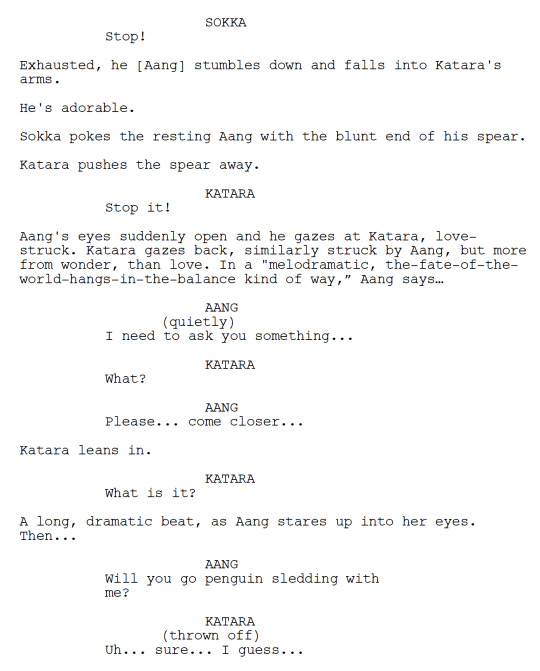
It’s love at first sight for Aang, which we all knew already. For Katara, it’s less “love” and more “wonder”. But it’s a powerful meeting for both of them. Honestly, this isn’t all that different from how I perceived this scene on television when I watched it.
Let’s continue with the Fortuneteller:
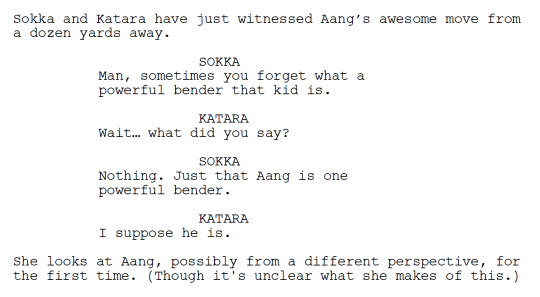
Okay, so again, roughly what we see on television. Katara realizes Aang could be who Aunt Wu was referring to, and is unsure what to make of this. Fair.
Next, the Cave of Two Lovers:
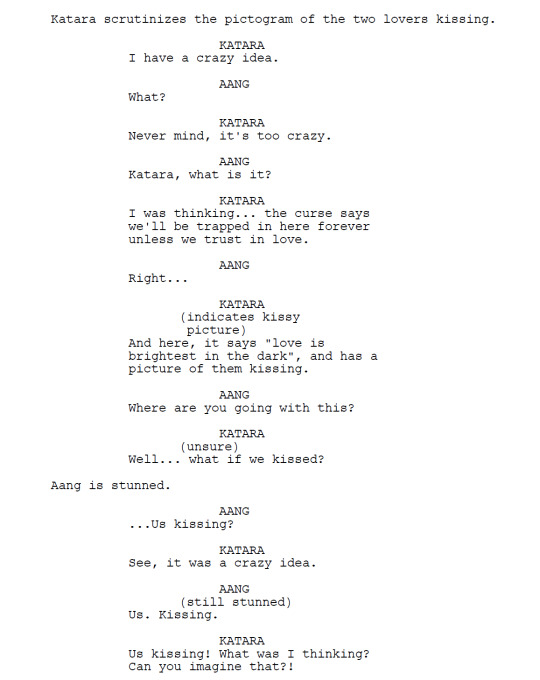

-----------------------------------------------------------------------------------------------------------

-----------------------------------------------------------------------------------------------------------

Unlike in the show, Katara doesn’t blush in this script (I also checked the ending of the script where I remember her blushing again in the show, but the script doesn’t mention any blush, anywhere). However, Katara seems to be taking the possibility of Aang as a love interest a little bit more seriously here. In the show version, they hug, Aang seems a little awkward and is clearly hoping for some closure/confirmation of where they now stand, but Katara doesn’t seem to spare it a second thought - she just yeets it out of there. The slow parting and the “awkward look” these kids share in the script suggests, at least to me, that script!Katara is placing more weight on what just happened than show!Katara does, and she at least seems aware, maybe even nervous, of the fact that sharing a maybe-kiss in a secret love cave might do something to their dynamic that she’s not sure how she feels about yet.
The divergences get more interesting now. Enter The Earth King scene, where Aang attempts to confess his feelings to Katara:
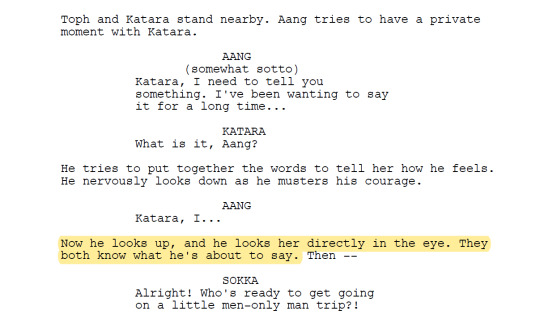
“They both know what he's about to say.”
WELL. Not only did they cut out the “he looks her directly in the eyes” part, but they completely took out any shot that might have indicated a mutual understanding between them, as was written in the script. Instead, we get a deer-in-the-headlights look from Katara, then her head cocks to the side “What is it, Aang?” and then… nothing. Everything about her body language on screen is written to suggest she either has no idea what’s coming, or is doing a great job of playing coy about it.
The cheek-kiss is intact in both versions, however. Let’s keep going.
I didn’t take notes on the Headband. I probably should have, but I didn’t bother because there weren’t really any notable differences between the script version and the show version. What you see is basically what you get - Aang dances with On Ji, Katara is agitated but acts aloof, Aang invites her to dance, she hesitantly accepts, they dance and it’s all very cute. She says “that was some dance party, Aang” and gives him another cheek-kiss at the end. If there were any differences from script to screen, I didn’t spot them.
But there was a pretty big difference for Day of Black Sun:
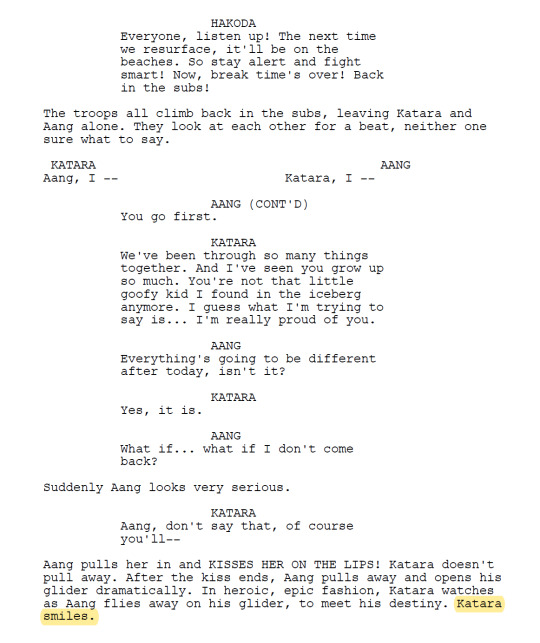
(By the way, this confirms an earlier version of the rumour that had been based on alleged edits made fairly late in the storyboarding process. Credit to @lady-of-bath for procuring this receipt).
So, what I’m basically getting here is that, in the original script, up until the midpoint of Season 3, the writing was originally heading towards a Kataang conclusion. And actually - you may disagree with me here but you know what? I actually don’t hate this version of Kataang. (So far, anyway).
There were two main issues I had with Kataang - the structure/pacing of it was all over the place, and on a deeper level I felt that the conflict they set up regarding Aang’s character arc and “letting Katara go” were not properly resolved in the show, leading to a lack of cohesion in the storytelling.
Combing through these passages, script!Katara reads way more natural and realistic, to me, than show!Katara. Let’s look at the progression here, from Katara’s side:
She meets an “adorable” boy and forms an instant attachment to him
She sees their dynamic as platonic until a comment from Sokka makes her question whether it will always be so in the future. She doesn’t quite know what to make of this at the time.
She shares a maybe-kiss with him in a secret love cave, and seems to be aware/nervous that their dynamic may change as a result.
Some time later, he works up the courage to confess his feelings with her, and the script makes it clear that she understands what he’s trying to say and may even have been anticipating it.
They go to a party where Katara is moody seeing Aang dance with someone else. Then Aang asks Katara onto the floor, and they dance, and Katara seems genuinely pleased/delighted.
Finally, just before the eclipse, he kisses her. She may not have been expecting it, but her reaction (smiling after him as he flies away) shows she didn’t see it as unwelcome.
If Kataang were actually written like this, I think that would solve the structural problems of the ship that really bothered me, and I probably wouldn’t have stopped shipping them. It’s very clear to me that taking any of these scenes, as written, and jumbling them out of order, would completely mess up the steady (if subtle) progression of Katara 1) seeing Aang as a potential love interest, 2) understanding he sees her as one, and finally 3) realising she does actually return his feelings.
It also makes Katara feel much more like a real person, and less of an objective for Aang to try to reach in a “two steps forward, one step back” sort of situation.
I think, even then, I still would have shipped Zutara as well, because I don’t think the symbolism and depth to Zutara can be beat. But I’m pretty sure I would have kept a soft spot for Kataang, for the fluff. At least, I wouldn’t be strongly opposed to it. My position would likely be “eh, there’s flaws, and it probably could have been written better, and I think writing Zutara instead would have been more compelling and thematically satisfying but you know what, this is cute. I get it.”
Of course, that’s before we get to the second half of Season 3, where Kataang goes from oscillating in place to taking a nose-dive out of ... nowhere.
And in a way that seems to seriously contrast with how the ship had been written from Cave of Two Lovers to Day of Black Sun, the downward spiral of Kataang coinciding with a deepening friendship/connection for Zutara - seems to be exacerbated in the original script.
Remember how uncomfortable it was to watch Ember Island Players in the show?
...
It’s quite a bit worse here.
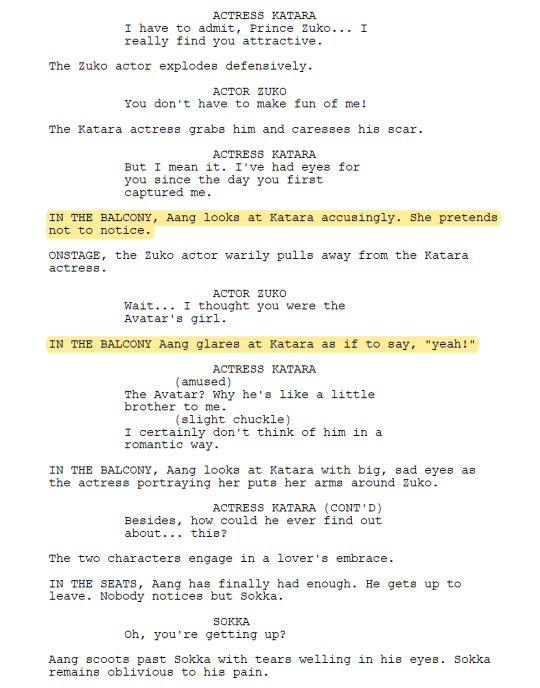

Aang comes off significantly less sympathetic in this version of the episode. Here he is, looking at Katara “accusingly”, and even “glaring” at her, because the actress playing her on stage is flirting with actor!Zuko. Why is he so angry, and at her? And meanwhile, she “pretends not to notice”? Ick.
I’ll be honest, I never had a strong opinion of Aang being “possessive” in this scene. I understand why other people did, and I totally see where they’re coming from with that. Personally though, I kind of gave him the benefit of the doubt and just perceived him as immature, not really getting it, and I always perceived his jealousy to be more hapless than disturbing. This is just my personal opinion, but I felt that their clash in this episode was more indicative of a lack of compatibility and understanding between them than anything else, and obviously I think the non-con kiss was wrong, but generally I didn’t think the kid had bad intentions - I just saw him as... too young, to be honest. He did get pushy and demanding, and either way Katara deserved better, but with Aang, I kind of understood it to be stemming from hope/desperation rather than anger/entitlement.
The writing here, however, does not leave room for me to be charitable. Aang hearing Actor!Zuko suggest that Katara was supposed to be “the Avatar’s girl”, and glaring at Katara as if to say “Yeah!” - I don’t know how to read this as anything other than possessiveness. Yikes on a cracker.
ALSO, did you notice that Zuko and Katara don’t scoot away from each other in this version? Read it again; the absence of that bit escaped me on my first read-through. (Credit to @zutarawasrobbed for spotting that difference!) Zuko and Katara are still sitting next to each other here (the earlier “I wanted to sit here/Just sit next to me, what’s the big deal?” scene is still intact), and all it says about Katara is that she’s pretending not to notice Aang simmering at her from two seats away. Wow.
The non-con kiss is kept intact and most of it is just dialogue so there isn’t much deeper insight to gain from the script, though again, Aang comes off more explicitly volatile/angry at the end of it:


Later, Aang rejoins the group in the theater, and sees Actress!Katara reach a goofy platonic understanding with Actress!Aang, and reacts to this with chagrin and embarrassment. There is no reference to Katara averting her gaze from the screen in a sad or awkward manner, as how she does in the show.
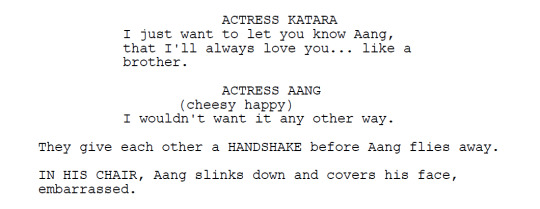
Overall, I find that Kataang looks worse here, a lot worse than in the show. The omission of Zuko and Katara’s “awkward scoot” is intriguing as well. To be honest, I never perceived “the scoot” to be explicit confirmation or denial of any potential attraction between them (that clip can genuinely be read two ways depending on what trope you’re trying to invoke; neither are inherently invalid), however, the fact that it wasn’t originally written but was added in later... that’s interesting.
Some of you might be forming some opinions by this point. I have some of my own as well, though I want to hold off on them for now. Let’s have a bit of a palate-cleanser with the snippet of Zuko sharing some vulnerability with Katara before we move on:

❤
Now I am going a bit out of order here - I know that EIP actually happens after The Boiling Rock/The Southern Raiders, but as I was already on the topic of the Kataang arc, I decided to continue with that before I delved into the other episodes. So now we’re going back a little bit, chronologically.
(Also, you know me, gotta save the best for last 😉)
Ultimately I had a very brief look through The Boiling Rock, and nothing really jumped out at me - except for this bit:

I can’t be the only one tickled at the idea that Zuko just yeets himself out of that prison cell and doesn’t seem to spare Mai a second thought 😂 (if you’ll recall, the show has the two of them share a glance through the cell window after Mai yells “Get off of me!”; Zuko looks apparently apologetic/sad while Mai just glares at him). I know people have pointed out how amusing it is that Zuko seems to forget about Mai completely after TBR, right up until their last scene together, but the way this scene is scripted here just makes it even funnier to me.
But I know which episode it is that you guys all want to read.

*record scratch*

Oh ho HO, what have we here Elizabeth Ehasz 😉
Next up - Part 2: The Southern Raiders, The Finale, and What I Think About it All
#atla#atla original scripts#zutara#kataang critical#writers guild foundation#part 1 of probably 3 parts#will try to get out part 2 asap#thank you so much for your wonderful patience#stay tuned!#text post#long post
871 notes
·
View notes
Text
A Summary of The OFMD Meta
Sooooo... this is part one of an incomplete summary of A Meta-Discussion Of The Subtext by meratrishoslee (Mera) on AO3 (linked to, as the author requests). I hope it’s helpful to the folks who’ve been curious about it -- heyooo @fahbee and @pushbuttonkitty -- but maybe not quite 90K-words curious! I’m not going to comment on anything; this is meant to be an impartial -as-possible summary.
It's massively long, so this is just the first eight chapters.
“There’s every possibility you are still in your feelings as you read this, even weeks after the finale. You are in your autonomous knee-jerk reaction, adrenaline-spike, slapped across the face, feeling-so-betrayed-right-now moment. You’re valid. That’s absolutely what’s happened… on the surface. But as you take a deep breath and begin to examine logically what’s in the show and engage with the material both in its text and subtext, you will see a new concept begin to take shape.” (Mera)
Chapter 1: Overview
Some background: Mera was involved with The Johnlock Conspiracy and believes that TJLCers weren’t wrong. (If you want a fun watch, I recommend Sarah Z’s YouTube video.) Essentially, TJLCers believe that Sherlock and Watson of BBC’s Sherlock were supposed to be endgame, and this can be proved with careful analysis. This is often paired with the idea that there is a missing fourth episode to the show’s fourth season that will eventually air and confirm all theories.
Mera defines ‘text’ and ‘subtext.’ Text is “dialogue lines / Shot choices and directions / Visible actions, describable as stage directions.” Subtext is “every single other thing, as well as what is suggested by or can be inferred from the text above.”
“Whenever something doesn’t make sense in the text, it is a BEACON (or maybe even a LIGHTHOUSE) to look at the subtext. Your subconscious mind recognizes subtext long before your conscious mind parses it -- assuming it ever does.”
The rest of the chapter is devoted to short descriptions of Mera’s key assertions with links to relevant chapters and their convention experiences. They cite talking to Con O’Neill at Florida Supercon 2023 as one of their reasons for believing so strongly that Izzy Hands is alive:
I asked him for advice in a specific time of trouble, and he gave me something real that had worked for him. I asked for a hug and he gave that also.
As I was pulling away I said "I’m glad that I gleaned one absolutely true thing from your portrayal of Izzy."
“What’s that?”
I said: "The character (in my original work) that Izzy inspired – when he’s out of pain at last, it’s impossible not to love him."
That seemed to hit him on an emotional level; he couldn’t hold my gaze after that. He said “That’s what I’ll be taking with me today.”
This was July 1st 2023, after completion of the filming of Season 2. I've thought about it often as the season went on, and how it must have affected him.
We have to love Izzy so that he'll live.
Mera spoke to Con again at NYCC:
The last thing I managed to get to say to him was: "They gave Izzy Hands a Passion Play."
"They did?" he asked.
"Yes, they did!" I replied.
And I watched that brilliantly swift mind again at work, because he considered it for the briefest beat -- and said in a tone of joy: "They did; yeah, you're right!"
I remember for the minutes and hours after I was amazed: did he not know, somehow? Did the writers not tell him (and he didn't realize at any time since) that in first quarter of the series they'd given him Gethsemane, a betrayal, a crucifixion (okay, getting shot in the leg and head, but don't get stuck on the details), a burial, and then a full on canonical resurrection?
Con then said another very important thing:
"But I got over it."
[...]
If Izzy's dead (for real and forever dead) and he knew it, then what he said to me was on a level of cruelty that I could never countenance from him. If Izzy lives, then those words are yet another piece of proof to me that Con was clever enough to be right both for someone who'd only seen five episodes, and someone who would eventually see all eight.
Chapter 2: The Cup and Ball Trick
The chapter is an extended “game” of cup and ball (where a ball is hidden under a cup and the guesser needs to determine which cup it’s under) interspersed with pictures from OFMD at various points in season two. It ends on a shot of Izzy’s grave where his body definitely isn’t.
The important takeaway: Izzy returns from the dead once to shoot Ed during Ed’s final suicide attempt. Ed returns from the dead after the near-fatal mutiny. Why would you think Izzy’s actually dead and in his grave at the end of the show?
“I didn't cry at the finale -- I was too filled with joy and excitement. I was Mary Magdalene at the grave; I was one of the first to know the truth of the resurrection, whether or not anyone believed me!”
Chapter 3: OUR LOVE MEANT DEATH
"..because if [Izzy] doesn't [live], with what I know now, his death is a cruelty struck at every queer individual alive or dead since 1981.”
Mera observes that almost no one touches Izzy’s bare skin and Izzy bleeds more than any other recurring character.
There are two times someone touches Izzy’s bare skin: first when his screams are being muffled when he yells at Jim and Archie to kill him, second when Ed puts the gun in Izzy’s ungloved hand during his first go at suicide.
Conclusion: "Izzy is coded with AIDS.”
Ed holding his bloody hand up to the rest of the crew away when Izzy is dying is a “warding-off gesture.”
Izzy is pale and sickly-looking as he’s dying. “My gorge rises. In the year of our Lord Shiva 2023 -- THEY GAVE THE MOST QUEER CODED CHARACTER ON THE SHOW A FUCKING AIDS DEATH.”
Izzy touches someone else’s bare skin twice in the show, and both instances are Ed. The first is in S1E10 “where he puts his left Death-marked hand on Edward's wrist as he's choking him.” The second is in S2E8 as he’s dying “in his ex-lover’s arms” (notably, this is the same hand with the spade tattoo).
“If Izzy's well and truly dead, for real and stays dead... He is in media both the first historically and the most recent chronologically to receive a full on AIDS death.”
“Until they prove to me and all of us that only Izzy's grief and the specter of AIDS remains in the grave -- and the rest of our beloved boy, our new unicorn (oh hey do you know what Problematic Modern Culture says about unicorn blood?), our pure-hearted risen being, our self-sacrificing queer man, will get his chance to be touched, held, kissed, and LOVED in Season 3.”
Chapter 4: “The Third Was For Death”
“Season 1 was Pinocchio: a wooden puppet wants to become a real boy -- and does! Hip hip hooray; that was pretty easy. Wow, the cute tall young guy of the crew lost a finger and the mean nasty short grouch that some people hate and some people like (because they understand him on a visceral, subconscious, subtextual level) lost a toe -- but if that's the worst that happens, we came out okay!”
Season two is “The Monkey’s Paw.” Mera tells the story with pictures from OFMD to emphasize the connections. Importantly, there’s an instance of a couple’s son coming back wrong after a wish (Lucius). The final wish returns the son to his previously-dead state and Mera ends on a picture of Izzy’s grave.
The cast’s and crews’ interviews might not support the real narrative because they’re not allowed to say what they want to (“Ever had to develop code language to hide your queerness from your parents, your teachers, the state?”) They’re all “in distress” and trying to tell us without telling us.
“Why does the new (old broken down) house smell like death? Why does everything we wished for that we got feel bad? Why does everything we're supposed to be happy about feel sad? How long would it take YOU to spot someone blinking out the word T-O-R-T-U-R-E?”
Mera hopes that the next season won’t tell us certain a new story: George Orwell’s 1984.
Chapter 5: Where Were We? Oh Yes, In The Pit Of Despair
This chapter is about The Princess Bride as it relates to Izzy’s story in seasons two and three of OFMD. It’s a comparison based mostly on costumes and lines; there are no one-for-one character comparisons. Vitally, the plot of TPB is used to predict the next season of OFMD.
Season two of OFMD ends at the part of TPB when Westley is thought to be dead (Izzy in his grave). Westley is revived, soooo…
“At what point does a preponderance of evidence flip over into fact? At what point does a handful of chance coincidences become planning and architecture? At what point do you go beyond a reasonable doubt into conviction?”
Chapter 6: Birdman and Blackbeard: Or, How To Watch Media
This chapter is about analyzing media. Once you learn how, you stop being a passive watcher.
“Instead you read its rhymes and rhythms like a sonnet. You go to the media in return – you meet it halfway, like a lover. You engage with it. You find themes embedded in the subtext that, once unearthed and examined, continue to inform and expand your experience of the text.”
“The people that like things nice and easy are the ones that watched the finale of Season 2, got angry and upset and – instead of examining those feelings and sitting with them and figuring out why everything felt weird and fucky – wrote it off as bad writing and cruel showrunners, and are already onto the next piece of media to pour into their open eyes and ears.”
And that’s fine! But if you like to think, you interrogate the media and see what else it’s saying.
Mera summarizes The Hero’s Journey through the lens of Orpheus’ story.
Season two mirrors season one almost too well. “...Why are they recreating their first season almost beat by beat? Why is this “second verse, same as the first – only a little bit louder and (in many cases) worse? Then Episode 8 hit… and I realized. They wanted to make sure that, in every conceivable way, the fans had a subtextual map of the meaning of Episode 8. So the mirrors between seasons had to line up almost exactly.”
Now we go into the three-act structure and how the hero’s journey maps onto it. Mera then uses Birdman or (The Unexpected Virtue Of Ignorance) and to show how they personally analyze meta, but I don’t care nearly enough about what they’ve gleaned from Birdman to go into it here. You’ll have to go read it yourself if you want their methods.
“Remember: Everything on screen in the finished and published movie is a choice. If something doesn’t make sense on a textual level, it is often a signpost (or LIGHTHOUSE) to look at it on a subtextual level.”
Mera points to an article about three-act structure and notes that “fun and games” is both part of that author’s second act and the title of an OFMD episode.
“Are we being fucked with? Or are we being instructed?”
Chapter 7: If You Strip Away The Myth From The Man
It’s the Jesus Christ Superstar chapter and it’s massive. I’m only including the most substantial comparisons and points.
Mera starts by linking to a gifset of Con talking about Taika saying that Izzy and Blackbeard are comparable to Judas and Jesus (and then Taika and Con sang songs from JCS while getting their makeup done). Notably, Con didn’t specify which character was which.
Blackbeard is a myth created by (of) two men, Ed and Izzy. “there's always two male bodies involved: Jesus and Judas, and both sacrifice themselves to the cause.”
It’s easy to say that Izzy is Judas, but wait -- there’s a better and deeper interpretation! Look at this picture from S1 that resembles the Last Supper and frames Izzy as Jesus! “Now I finally understood. Sure: Izzy is Judas-coded. That's plain for anyone to see. But Izzy is also Jesus-coded… from the under/reverse side.”
Izzy is Jesus-coded for all of season one (even more than Ed), and the comparison is solidified by the end of S2E3: “Izzy Hands is almost fully and directly Jesus-coded, and after Ed's own resurrection (not as an agape-love self-sacrifice for the saving of others, but through selfish personal/eros love alone) Edward is now obviously the betrayer of the whole crew who is permitted to stay aboard only on terms of sackcloth clothing and uneasy tolerance.”
Judas died by hanging himself according to the Gospel of Matthew. The only characters we see hanging are Ed and Stede, which clearly aligns them with Judas.
Izzy is a good person. He cares about the crew; Ed never does. When Izzy’s wrong, he fesses up to it and apologies; Ed does not (or when he does, the apologies are bad). “Does he lie? Yes, ostensibly to protect his captain and crew. Is he fairly mean to the Revenge crew until they [...] become his crew? Pretty much, although I could argue otherwise in places -- especially the fact that while Ed throws Lucius violently and bodily off the ship without any warning, Izzy carefully puts the crew on a safe island with a minor fuckery of his own to keep them calm and happy until he leaves. (It's obviously not Edward's idea, although he does permit Izzy to put himself between the deadly Kraken and the Revenge's crew in order to accomplish it.) Is he selfish? Yes, and who of us aren’t sometimes selfish about the people we love?”
Jesus and Judas have massive amounts of sexual tension (yeah, can confirm). Izzy is Jesus-coded because, while he doesn’t initiate contact like Jesus does in JCS, he’s always looking directly at Ed. Ed is Judas-coded because he has a hard time looking at Izzy and finds it difficult to touch him.
“...If Izzy Hands is a queer man who is Jesus-coded, who we see go through not one but TWO passion plays during Season 2... [near-death after having his leg removed, end-of-season death] he is conquering the death of HIV/AIDS and queer grief. He has to die so that he can vanquish that very real death, and arise again triumphant over it.”
“One direct correspondence with Jesus is that Izzy is convinced of one right way to be (whether or not it actually is), and everything outside of that offends him viscerally at this point in the series.” Izzy is convinced that there’s one right way to be a pirate, and Stede’s fucking that up.
And back to AIDS/reverse-Jesus Izzy: “Now among the lepers we're back to the reversal: no one touches Izzy. He’s desperate for it yet can never allow it. Jesus’s touch, kiss, love cures – and everyone seeks it and craves it. They demand it, they swamp and overwhelm him. Jesus's naked touch/kiss/love cures disease -- Izzy's carries and spreads it.”
“Judas/Edward makes his deal with the priesthood/King George to betray Jesus/Izzy – his price is 30 pieces of silver/Stede’s life.” That is, Ed is the one doing the betraying in season one.
But the real betrayal happens when he cuts off Izzy’s toe and feeds it to him while he’s vulnerable. Important note for the AIDS stuff: “...Edward puts on leather gauntlets immediately prior to this assault -- he ‘gloves up.’ He doesn't have direct naked contact with Izzy's blood or flesh during this scene.” The toe-feeding scene is absolutely framed as sexual assault.
And the toe thing continues into season two. “Sit with that also for a moment: the faux consent of making Izzy remove his own clothing to bare his body parts for this violation. Is it too far a stretch to think that Ed also made him eat each one, in their own private, gristly sacrament? He did threaten to ‘feed him the rest’ after all.”
Here is the outline of Izzy’s first “passion play”:
Izzy's Last Supper: all the toes eaten before as well as the one threatened now.
Izzy's Gethsemane, wherein he begs his God for the cup to be removed: he tries to bargain his and the crew's way out with his conversation with Blackbeard, to find an alternative to the self-destructive violence.
Izzy is betrayed by his Judas (again): shot in the leg for the 'crime' of mentioning Stede Bonnet's name, or Blackbeard's affection toward him.
Izzy descends into the grave: lays in a secret tunnel in what we can believe is the lowest part of the ship, while rotting enough to be smelled throughout.
Izzy dies: he shoots himself in the head and both we and Blackbeard believe him to be dead.
Izzy is risen: he hauls himself up out of his own grave without assistance from anyone else, crawls to the main deck, reloads his pistol somewhere along the way -- and shows himself to his followers crew at last, in order to bring about their salvation.
Con himself said that this is a passion play, and it takes up a massive chunk of the first part of the season. You don’t throw something massive like that into a show unless you’ve got something bigger coming.
But Judas dies before OFMD ends (mapping OFMD onto JCS), so now who is Ed? He’s Pontius Pilate. There’s the whipping of Jesus (Izzy’s back scars), then Pilate kneels down to hold the bleeding Jesus in his arms. It’s this specific Pieta statue.
“Izzy has to die to conquer his own living death, to end the curse that has kept him untouchable and unable to be loved as he so desperately desires.” There’s the crucifixion for you. Izzy dies and is buried, and we’re still waiting on the resurrection.
The last shot in JCS is of the empty cross; the last shot of OFMD S2 is Izzy’s grave. “If the cross in the last and arguably the most significant shot of JCS symbolizes the triumph of resurrection and rebirth... the one in OFMD S2 must also.”
Alex Sherman liked one of Mera’s Izzy Lives tweets that he was tagged in.
Chapter 8: The Dual Substance Of Christ
Now we’re looking at The Last Temptation of Christ. This is another long and involved one, so I’m cutting a lot of minor things that don’t serve the overall meta. (I also know fuck-all about this movie, oops.)
“An argument can be made (and I will attempt it) that Judas in this instance is not only the show creators/writers room of OFMD who had to put their much beloved boy Izzy Hands through all this agony... but also we the Unseen Crew who adore him, who have suffered alongside him through all he's endured, and who want nothing more than to have him back and whole in resurrected triumph.”
TLTC presents another reason to identify Lucius with Mary Magdalene (and notably, Jesus can’t touch Mary -- because Izzy is AIDS-coded). Once again, there’s an immense amount of sexual tension between Jesus and Judas.
This Jesus is angry and this God is fearsome. Judas does a lot of slamming-Jesus-into-walls, much like Ed and Izzy in S1E10.
Jesus confirms that he is a heart and he loves, which solidifies Izzy’s position as the heart of Blackbeard.
In his final trial in the desert, Jesus’ final tempter appears as flames. Izzy and Ed both play with flames when they lie.
“Izzy is pretty much Jesus-coded as I explained in the JCS meta… but here also due to the timing and content of this scene, Izzy’s also Lazarus-coded.He dies, he goes into the pit of the grave, he smells of rot, then he is raised from the dead.” Lazarus and Izzy both have a rough time of being alive again and drink about it.
Jesus says “I have to die on the cross, and I have to die willingly.” This parallels Izzy saying that he wants to go when he’s dying. Judas doesn’t want Jesus to die, which puts him more in line with Jenkins and company than any characters.
“But Izzy has to die, in order to conquer death. He’s lived with the specter of HIV/AIDS that has separated him from loving touch and the sharing of physical intimacy. He has to go into the grave to leave his disease and his queer grief behind, and to be reborn to love.”
On the cross, Jesus says, “Father, stay with me. Don’t leave me.” As he’s dying, Izzy tells Ed, “Sit with me, Eddie.”
“I feel sick, and I think I’m supposed to. It’s supposed to hurt. Both Izzy's death and Jesus's crucifixion are supposed to be two of the realest and most awful and most beautiful things I’ve ever seen on television.”
In TLTJ, there’s an extended part of the movie where Jesus is in a kind of gravy basket. The events are all kind of odd. They involve Jesus sleeping with Mary (the reborn unicorn, free of AIDS and safe to touch). Jesus returns to his body, suffers, and dies.
TLTJ doesn’t cover Jesus’ resurrection. “We have to trust what we know of the story: that Jesus is risen, and only death itself remains in his grave.”
--
On to the next!
#ofmd meta#but like ofmd meta summary#which is wild#izzy critical#i mean not really#it's a summary#no commentary from me#continuing the trend of spending hours on something for like three people to read#hey tumblr why is my spacing wonky when i post
64 notes
·
View notes
Note
I'm unable to fathom the logic of J0nrya shippers. I recently got into a twitter altercation with a couple of accounts and oh my god, I totally forgot how terrible they are ! I have all of them blocked on here but they must be on twitter as well, I even recognised some of the users. It's just awful energy all around; all of them despise Sansa, no matter what she says and does. And they are SO weirdly possessive of Jon. They claim that WE treat Jon as some trophy husband when it is actually them who are guilty of that! They even hate it when people make simple Sansa/Ned parallels because apparently Ned belongs to A as well? Never mind that Ned is also Sansa's father...smh.
Their copium is very loud and obnoxious. I wonder how they felt when GRRM straight up debunked the ship at Balticon. Calling J/A relationship by all accounts, quite simple - that the fans have given it more thought than he has etc. I would have just packed up and left after that and accepted it wasn't going to become canon. But alas, they get even louder than how they were before. Do they understand how weird they sound. They sexualise A so much and want her to become a courtesan and get her period. It's very obvious A is not going to be the love interest because GRRM has done everything in his willpower to portray A as a prepubescent child. But he has done the opposite with Sansa; He's made her tall, full-breasted, acting as a mother to a child, basically running the household in the Eyrie etc. sometimes I forget she's meant to be 13...
We all know that when someone is on the right track, GRRM will respond cryptically and give a short, sweet answer. He rambled when it came to j0nrya, that's not a good sign for the canon basis of their ship, especially when they have the nerve to call Jonsas delusional.
The truth is, I wouldn't still be here fully believing in the inevitability of Jonsa if GRRM debunked it in the same manner he did w J/A. When that Alexandragenesis person asked him about it back in 2018 and GRRM just responded with "not going to tell anymore than I already have" I knew that we were on the right track. If GRRM flat out ignored the question or responded with a simple "not the direction I'm going in" since he had no issue debunking another theory on that same chat...if I remember correctly, well I'd have left and accepted I just misinterpreted the text and saw romance where it wasn't meant to be. I'd still read fanfic about them and enjoy them in a fanon way, and I still believe all the brilliant metas hold merit, no matter if they're meant to be interpreted as romantic by the author.
But j0nrya's didn't let go of their stance and just cracked down harder on jonsas. I'm embarrassed for them. I don't care if they ship it in fanon, if they just enjoy it as a pairing and have accepted it won't become canon based on the author's blatant dismissal of any romance between them - but the way they have behaved in this fandom is really really childish and frankly, irritating. They actually dominate reddit as well, surprisingly. There's quite a few popular Redditors on there who get lots of upvotes and who are also big A/J0nrya bloggers on here. And sometimes there are posts about Queen A/J0nrya which is met with 0 criticism by the community. There's healthy discussions which receives heaps of upvotes and everything. But it's the opposite situation with queen sansa and Jonsa. Little to no upvotes and harsh criticism.
Are these people selectively blind? Is this fandom completely unable to understand subtext and implicit clues/foreshadowing? Do they get how fiction works? Do they get the different literary influences that inspired GRRM to write ASOIAF? His past works? His favourite authors? The themes of his series? The importance of omission? Unreliable narrators? Dramatic irony? Have these people never studied a text before and been made to pick apart imagery, sentences, parallels etc?
I'm just baffled by this fandom having such a surface level reading of the text. "BUT JONSA COULDN'T HAPPEN BECAUSE THEY RARELY THINK OF EACH OTHER!!" If they took the time to read our metas they'd actually realise... that works in our favour...the distance supports our theories...that's exactly what we are pointing out lmao. I'm utterly convinced that if Jon was mussing Sansa's hair and thinking of her as his little sister constantly that Jonsa would hold a lot more merit.
I mean, even just the implication that GRRM's response to Jonsa was clearly 'fan service catering' is so fucking disingenuous I have to laugh. Why would GRRM feel the need to appeal to such an incredibly niche fanbase and tell them what they want to hear when majority of the fandom wants Jon and D*ny to have sex and save the world together. And when you compare how GRRM responded to Jonsa vs how he has responded to R + L = J, it's so obvious that Jonsas are actually the ones who are making sound predictions. There's a reason a lot of us correctly predicted major beats in the show while the rest of the fandom were foaming at the mouth over Sansa being killed by one of her family members, queen d*ny, and the curtain of light theory ....
My Twitter account is locked for a reason. Somehow they always find you only to attack you.
Anyway, fave sister stans and fave sister/jon shippers are a funny bunch lmao I mean only them can write metas about fave sister being Lady of Winterfell *by proxy*, or that "official" Asoiaf fanart *confirms* that fave sister is the most beautiful human being on earth, or that fave sister and aunty wearing baby pearls means that they are the epitome of fertility and motherhood, despite them both hating those attires and quickly changing on masculine clothes 🤪 And I won't mention the training with a courtesan because that's sick 💀
I won't fight them on fave sister being jon's fave sister, that relationship can stay like that lol
I won't fight them on fave sister being Ned's fave daughter, that we can't change and there's reasons that vastly explain that.
They simply decided to ignore BALTICON, and they also do the same that cujo shippers do, they made up a narrative where GRRM knowing that they "rightly discovered" that their fave romance is *canon*, tried to mislead the readers to keep the susrprise factor when their ships happen . . . . ahxvasdhbshfbdfjsbdmjwd.alsdshadb
Did youk know that the Alexandragenesis was probably a hater from reddit trying to get GRRM debunking Jon/Sansa? Alexandragenesis is some fake disorder that gives you violet eyes born in the internet, so that name was targ coded. Also, after GRRM didn't give them the answer they were seeking they started to attack fave sister in favor of Sansa, so that person was definitely a Sansa hater/targie/fave sister stan failing as always lol
I think they read our metas and feel really dumb after that but they will never admit it, at least not in public, which reminds me of these two anon messages I got from them once:


. . . 🙈
They really said the GRRM answer to the jonsa question was fan service??? 🤡
I'm telling you, they are a funny bunch 😂
Anyway, I can't believe the curtain of light is a thing . . . . 🙃
Thanks for your message anon 💋
22 notes
·
View notes
Text
CHARLI XCX FT. LORDE - "THE GIRL, SO CONFUSING VERSION"
youtube
We opened July by giving you a Charli remix; we now close July by giving you a Charli remix. Let's work it out in the blurbs, then see you next month!
[7.62]
Julian Axelrod: The girls are fighting. The girls have always been fighting. Sometimes with each other, sometimes with their labels, usually with themselves. But even in a year dominated by petty beef, the girls are rarely fighting on record. Leave it to Charli to realize pop music is all wrestling and execute a perfect reverse heel turn. The week BRAT dropped, pulling back the coke-stained rug to reveal a trap door of professional insecurity, fans and critics clung to "Girl, so confusing" as the last vestige of the carefree club romp we were promised, spawning a million think pieces about which curly-haired brunette started the beef. Bringing Lorde into the mix one week later was at once an escalation and denouement, negating the feud narrative and digging down to the real emotions buried beneath its glossy sheen. Charli resents Lorde's success, her flakiness, and her critical acclaim. Lorde sees Charli as a 365 party girl too cool to acknowledge her, let alone invite her to collab. It's all so insular and meta and self-obsessed and earnest and honest and real, to the point where it's almost too intimate to witness. But it's a testament to Charli and Lorde that the whole thing doesn't topple under its own weight, and hearing them write to each other's style makes you realize they have more in common than just hair. The girls are talking. The girls are collaborating. The girls are working it out on the remix.
[9]
Jacob Sujin Kuppermann: Iconic! Culture-changing! This could have been a podcast!
[5]
Andrew Karpan: Upon release, it was funny to hear the speculation that this record was about Lorde, in that way that it is always funny to know something that feels intimate and real about a roving symbol of pop phenomenology. At any rate, it was satisfying to hear that we were right. Turning this from subtext to text feels like a decisively modern gesture, a living and breathing genius dot com annotation, something one could easily confuse for Taylor Swift’s 1989 rollout or any other kind of “this phony fake friends fake girl power shit” -- but I’m less inclined to be cynical, even in the meme economy of it all. The fiction of these two people with their relatable problems is played so straight that I practically cried at the end. She rides for Charli! Charli rides for her! Hang it in the Louvre, but down in the back.
[8]
TA Inskeep: I've traditionally not been a fan of Charli XCX, for various reasons not worth getting into here. That's relevant because I am thoroughly knocked the fuck out by the next-level-meta "girl talk" dialogue of this meeting-of-the-minds remix. Lorde responds to Charli's verse with a lacerating one of her own, spilling her guts and getting very real; talk about "work[ing] it out on the remix," goddamn. Charli, of course, is expert at riding producer A.G. Cook's hyperpop rhythms, but to hear Lorde matching her as the track heaves and bumps is a shock. This is profoundly soul-baring pop, what with Lorde candidly talking about eating disorders and Charli admitting on her opening verse "I don't know if you like me / Sometimes I think you might hate me." That they're doing this so publicly is frankly stunning. This feels like -- this is -- a true pop moment.
[10]
Alfred Soto: They're having fun, and for once one of these interrogations sounds lived-in. The beats pop harder. Listening to Lorde and Charli ribbit around the cheerful electro-frogs is a visceral pleasure. Few of the problems they describe code as "girl," though, so I'll be the spoilsport.
[7]
Katherine St. Asaph: The original "Girl" had three problems, none of which got worked out on the remix. Problem the first: As with hot girl walks and girl math, this stuff is not especially girl-coded. Social anxiety and fake friendships are the human condition! Problem the second: I know it's a fandom joke, so apologies for bringing reality into your memes, but it must be said that basically no one is out here seriously comparing Charli XCX to Lorde, at least that I recall. I did a quick search to prove that I hadn't gaslit myself for a decade, and all I could find was this interview; which was almost definitely a bit; this anecdote about a taxi driver, which is mostly telling about the tastes of taxi drivers; and this Vox piece, which is... not good (or if you want to be charitable, maybe also a bit). In a music world where half the girls are regularly compared to half the other girls, that's an honestly impressive display of how much something hasn't happened. I know that none of us are privy to the actual lived history of Charli and Lorde's friendship, and I can certainly admire Charli stoking a grudge for 10+ years. But the emotional stakes just don't feel as dramatic as they've been hyped to, and thus the Internet inside my heart remains unbroken. Problem the third: There's also a song beneath the parasocial moment-making, and it sounds like "Take My Hand" but not as fun.
[6]
Will Adams: Will I be sent to the gallows if I admit that this pairing had about the same emotional impact on me as when Taylor and Katy reunited in the "You Need To Calm Down" video?
[6]
Hannah Jocelyn: I got thrown into the fire when it comes to female friendship, and honestly I still don't get it. There are entire movies about how nobody gets it, men just assuming women disappear into each other without a man to anchor them. I feel like cis women have the same bafflement, and they've been women for longer than I have. The questions are the same: do you like me? What do you need from me? Do you desire my company? What can I be, and what do I look like from this particular angle? Am I the one you tell your fears to? Do we have the same hair? Do you want to be me? I don’t think it’s a coincidence that this is in the tracklist right after the SOPHIE tribute of “So I”; it’s the same push-pull dynamic, the fascination and the fear of getting too close. Lorde’s devastating verse reveals the insecurities underpinning her decade of coolness, but she manages to add another quotable to her pantheon at the same time: “let’s work it out on the remix” is as sweet as “you buy me orange juice” and “down the back, but who cares, it’s the Louvre." I don’t care much about the rivalry (if there really is one) and don't need to, and that lack of care for extraneous knowledge is why I don’t quite love Brat like the rest of the internet. The juxtaposition between electroclash and Real Feelings occasionally feels like a gimmick, but the best songs make the melancholic subtext into text. This one, with its flanged chorus and cyclical chord progression, gets across the angst underneath the blurry JPEGs and silly memes.
[8]
Taylor Alatorre: It's unfortunate that the zero-sum economy of the pop remix led to the excising of the song's most crucial lyric: "Think you should come to my party / And put your hands up." Apart from its now-obsolete function as a barely veiled clue, it encapsulates the nervous mixture of resentment and admiration that bleeds through both versions and that is so hard to portray sympathetically, let alone with such an impish wink. Charli, as someone who attended more warehouse raves than I did in the early 2010s, had more of a reason to puzzle over that particular line from "Team," to shake her head and wonder whether this post-twee moralizing was really what the kids were into – "the kids," of course, being those three to four years younger than her. Like, it just seems so childish to be genuinely bothered by the chorus to a Flo Rida hit, doesn't it? And yet Charli XCX still goes by the MSN screen name she had when she was 14. The "girl" in the title is as much an age signifier as it is about gender, and the humanizing awkwardness of the remix is a product of its function as an intermural high school reunion, the kind of event that's "confusing" by necessity even if it goes well, which this one does. Your Pop Class of 2013, 'til infinity.
[7]
Jonathan Bradley: In 2011, an eternity ago, Drake offered Kendrick Lamar an entire track on his Take Care album, giving the then up-and-coming Lamar space to talk over his worries about fame and the professional anxieties he felt regarding his more successful host. "React like an infant whenever you're mentioned," Lamar recalled of the Canadian. "He said that he was the same age as myself, and it didn't help cause it made me even more rude and impatient." Having worked it all out on the remix, surely no trouble between the two would ever rise again. So confusing! In 2024, Lorde and Charli XCX connect to puzzle out some feelings, and it works better as an event than a single. Lorde is a savvier writer than Charli and works away at old wounds and insecurities with a sense of intimacy that only appears artless. Unfortunately, the production runs her through filters and bleeps that mold her presence into simply another type of Charli, dispelling the tension created by bringing these two women together. Blame it on Ms. XCX.
[5]
Jackie Powell: The beauty of this remix is how it shines a light on how women in pop in 2024 deal with "diss tracks" -- although, to be honest, the remix makes me question whether "Girl, so confusing" really was one in the first place. Diss tracks often don't reveal complex emotions but just function in a universe filled with envy and pettiness, but this remix reveals the chaos that resulted from poor communication, fear, body issues, anxiety and depression. Both Charli and Lorde admit that the confusion of being a girl is a result of comparing your insides to someone else's outsides, a mental exercise that's often destructive but difficult to stop. "It's you and me on the coin/The industry loves to spend" is their acknowledgment of what came across as transparent and icky on Kendrick Lamar's "Not Like Us." Also, Lorde sounds the most compelling she has since 2017's "Melodrama"; while I always prefer less Auto-Tune than more, her talk-singing with audio distortion behind her vocals reminds me why she was so beloved. Her messaging is focused: Lorde at her best. Her vocals are dark: also Lorde at her best. What I find most fascinating here is the choice of words during the final pre-chorus. Charli and Lorde sing that they "ride for each other" after working this out, which sounds more sincere than singing that they now magically love each other. It's not an artificial "love ya," but the more sincere "I see you and I know now what you've been through." I'm actually quite jealous of how seamless this appears. Charli and Lorde are somehow giving me some hope that maybe my own friendship breakups could have been resolved by something like this.
[8]
Wayne Weizhen Zhang: Too many friends, not enough time to keep up. Too much life. Too much work, too many health issues, too much doomscrolling. Too much fun and connection and joy had together, but then rewinding it back, wondering whether everyone else felt the same way. Too much anxiety, becoming paralysis, becoming withdrawal. Too much wondering, "Did people notice I was missing? Should I reach out? Is this made up in my head, and if so, why?" Too many panics, trying to find the exact date of their birthday. Too much energy spent internalizing the loss—or even the potential loss—of friends as my own fault, not enough time spent understanding circumstance and accepting change. (Coincidentally, too much “Bad Friend” on repeat, god bless.) Too much time wasted not reciprocating the love of others, when they easily and excitedly extended the grace that I didn’t extend to myself. Too much adulthood, so confusing. But in this song? Just enough. Just enough sweat, enough mess, enough of the internet going crazy. Just enough payoff for being terminally online. Just enough intrapersonal catharsis, brought by talking it out, and making it clear that you do indeed ride for each other and will always “work it out on the remix.” Just enough tears shed, understanding that others, including the ones I idolize, can feel the way that I sometimes do. Just enough possibility of redemption. Just enough hope for salvation.
[10]
Nortey Dowuona: Two things I learned today. 1. Lorde is still her. 2. We need to re-evaluate Solar Power.
[10]
[Read, comment and vote on The Singles Jukebox]
#charli xcx#lorde#music#pop#pop music#brat#music writing#music reviews#music criticism#the singles jukebox#Youtube
19 notes
·
View notes
Text
Random thoughts about Hawaii Five-0 rewatch: part 1/?
So, as someone of my mutuals already knows, I'm currently undergoing the exhausting task of checking all the fucking 61 DVDs from the H50 box set before the 30-days guarantee expires, because it's physically impossible to watch them all completely in that time, even if I took 1 month leave. So I'm simply skipping back and forth and leaving the regular rewatch for when my life will be less of a living hell...so, supposedly around 2038...
I have one complaint, which is the subtitles are not completely matching all dialogues, but since my brain only needs them until it's switched to English-mode and I can start understanding it again, I guess it's alright. Second complaint: they're fucking HUGE and OVERLAPPING THE SCENES SO RANDOMLY IT HURTS.
Anyway, I've by now processed only s1-s5, and dude....some things I caught in the deleted scenes (which I've watched entirely) AND in some parts of the commentaries I specifically sought because curiosity won, and which I've never seen giffed or captioned....man, I was so angry and disappointed at times. So I thought I'd be randomly processing them here, no pics sorry, only thoughts.
~~~~~~more under the cut~~~~~~
Thought #1: Alex and Scott goofing around.
Trust me. The gag reels are so much better than you'd expect. At times I was genuinely laughing to tears and god knows how rare it is.
What I loved most was to watch that scene where Alex and Scott start cussing in Italian, and I bet no one who's not Italian could understand a fuck about what they're yelling. Best part, though, were the subtitles, captioning ALEX AND SCOTT: SWEARING IN ITALIAN 😂 Just to make sure what language exactly they were using.
Thought #2: missed chance to make Amber's character less of a plastic doll, or: Why did you fucking cut those 57 seconds?!?!
While watching s5 deleted scenes, I stumbled upon two real jewels from the 24th episode. I'm still trying to understand why they couldn't include them in the canon episode, since both of them combined are less than a minute and surely there were other moments that could've been cut. My only explanation, sadly, is that it would've painted Amber in quite a different light, making her a stronger, rounder character, and giving her an agency we rarely saw in her, except when confronting her ex husband. They could've followed that route, but we cannot have a beautiful woman who's also her own person, a self-confident person, and not just a plastic Barbie doll, right?! God forbid a woman can have agency and call out men on their bullshit, it would threat masculine privilege too much....
So, what exactly happened that bothered me so deeply? (Be aware I'm quoting by heart and not literally, as I didn't take screenshots and anyway I can't make gifs. Also, the following meta is just my interpretation of the implications running through subtext).
The first scene is very short, just six or seven seconds long, but it's a jewel in subtext and non-verbal communication. It takes place presumably after or around the moment Rachel tells Danny about Charlie: we see them from afar, clearly in a street-taken point of view, from an external observer. They are agitated and distressed, Rachel more than Danny, who's tensely spread on the bench with his arms looped behind the backrest, angling far from Rachel's compact and almost self-hugging frame.
They're distressed, not happy, not even remotely connecting to each other, so it's clear it's not a scene which could be envisioned as romantic. It's only a couple of seconds long, and then we see whose this external point of view belongs to: Amber. Amber who's not an idiotic, mellow, shallow doll. Amber who's been so clearly upset by Danny's lie about the texts, that she decided to follow him to the place Rachel had indicated. Amber who's been manipulated and controlled and abused long enough to become suspicious and self-preserving when someone she loves, and who knows her vulnerability, tries to play her around. Amber who looks at them, and clearly isn't angry nor jealous, because those few moments the actress uses to convey all of Amber's inner distress, are some of her best ones (giving that the actress, alas, is not very expressive to begin with), and we understand that she doesn't see any romance in the air. She's disappointed. She's hurt. Betrayed. Again.
Amber's face, in a handful of seconds, perfectly displays the devastating feeling of someone who finally felt safe and respected and secure, only to discover that it's yet another kind of control and manipulation, less cruel, less brutal, but not less humiliating and even worrying.
This is something she's learnt at her expense, and now that she knows the red flags, she cannot trust a man who can't be honest with her, not with this kind of problems, not with something which is clearly affecting his life to a deep level. He wants Amber to be a part of his life, but only if he can control the terms, limits, boundaries and times of their relationship. And Amber has been through it all before, and can't trust that history won’t repeat itself.
She then drives away, hurt and disappointment written all over her face.
The second deleted scene is even more important plotwise, because it explains Amber's absence as Danny’s plus one at Kono's wedding, after all the talk he did in the car about bringing some Amber's friend as Steve's date, and it casts a new light over Danny's reaction to Steve's resolve to ask Cath to marry him, or his tension about Lynn, or Amber's condistent absence for the whole first part of s6, or even Danny's and Amber's fight during their Valentine's dinner.
The scene is longer, about fifty seconds, and it supposedly takes place right at the end of the episode, after Danny pulls up at the hospital's parking lot, after Steve's affectionate text. He takes his phone out of his pocket again because he's received a voice-mail message.
A message from Amber (sorry, I noticed just now I'm still going with Amber instead of Melissa).
She says she's sorry to be doing this by voice-mail because she'd prefer to do it in person, but given their situation it's probably for the best if she spares them both the trouble to be forced to find shallow excuses. She says he's an amazing man, and that she likes what they have and that she thinks it might be real, and that she hopes he feels the same. She's understanding that his job comes first and it's terribly demanding, as she's also aware of how hard his life and his backstory is, with Grace and Rachel. This all considered, she thinks it's best if they stop and take a pause, so that he can reflect and decide if he wants to keep this thing going, but as for now, she can't keep seeing him on these terms.
Amber decided to stop seeing Danny until he decided what to do with their relationship and be honest with her, and started thinking seriously if he was just using her, as she probably felt.
Why?? Why did they cut this whole plotline? It's pivotal for Danny's arc, for his strained and angry attitude towards everyone, for his constant distress, for his even worsening negativity, for the way he's overcompensating with excessive euphoria to Steve's announcement about Cath, for how he meddles with them and confronts Cath about being honest, for how he's not thrilled about Lynn's insertion inside Steve's life.
Because he's alone, at that time. Call it temporary breakup or period of reflection or a break, but he was single and thinking, again, about everything he was doing wrong with his life and his relationships, and falling again into his old black hole of depression and self-sabotage, and seeing Steve going on with his life even at the cost of pretending he was happy with this woman he had supposedly no trouble cheating on, during their "couple retreat", making him wonder if either what he had with Lynn wasn't serious, or if his obvious charade about his threesome with Alyssa and her friend had a second meaning.
Also, they were probably both single again, or at least testing the waters, when they were at the retreat. And Danny definitely was when Cath left Steve once again abandoned, betrayed, and never-chosen in face of anything else.
Quite a lot of subtext to think about, for just 57 seconds which were, prudently, cut.
#h50#mcdanno#steve mcgarrett#danny williams#h50 5x24#danny/melissa unhealthy relationship#rachel edwards#h50 meta#h50 rewatch#h50 deleted scenes#h50 gag reels#long post#amber vitale#melissa armstrong#alex o'loughlin#scott caan
58 notes
·
View notes
Photo
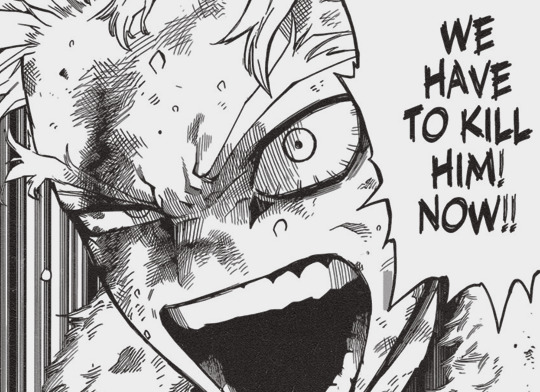
My Hero Academia, Chapter 374 Thoughts.
Why did the tide turn in the battle, just when Deku was about to finish off a ShigAfo who was well past his limit. Well, it was because Spinner managed to wake up Kurogiri, therefore teleporting all of the villains to the same battlefield sabotaging the hero’s strategy to keep them separate and finish them off individually. However, there are deeper thematic reasons beyond just the strategic aspects of the battle. The villains triumph when the heroes refuse to fix or face their mistakes, so how appropriate the last page of the chapter is Dabi and Twice facing two heroes who don’t want to own up to their mistakes?
1. Endeavor and Hawks.
There is a lot that can be said about Endeavor and Hawks, but I think for the sake of directness rather than delving into their backstory and motivations, it’s more appropriate to focus in on why they haven’t changed.
Before I being though let me explain personal narrative. Narrative is well.. you know... a story. It is how a series of events are told. There are different kinds of ways narrative are written up, for example first person is told as a limited personal account from a single narrator using “I”. In third person the perspective is told from outside of the characters. There are even differences in third person, third person limited can still be told in one character’s limited perspective so they are not privvy to the thoughts and motivations of another character, whereas third person omniscient can randomly jump around into anyone’s heads.
All of this to say is that narrative is telling a story, so one step ahead personal narrative would be like a first person narrative, or a third person limited... it is the story as told in the character’s own head. Oftentimes however, this personal narrative they have will be different from the objective events that are happening in the story.
There’s one thing you should always remember when reading a story, “Characters are liars.” There is text, which is the things either they through internal or external dialogue, or the narrative through prose blatantly say and then there is subtext the underlying theme or implications and you have to consider both when reading.
In other words, Endeavor and Hawks are liars. The internal monologues inside their own heads, often disagree with the reality of their actions. Many times viewers have commented they seem out of touch with the reality around them and this is caused by them being so wrapped up in their personal narratives they can’t see what is happening around them. ANd in doing so, they ignore the feelings of the people around them. I think AFO, as awful as he is, makes some good points sometimes.


I’ve said as much in previous metas, but the heroes as a whole tend to dismiss or even outright ignore the feelings of the villains they are facing, even when villains make honest attempts to communciate why they are doing what they’re doing. When AFO is making that speech, who shows up but Dabi and Twice, the two people that Endeavor and Hawks ignored the personal feelings of.
Toya, was created by the Todoroki Family at the behest of Endeavor ignoring his feelings until they exploded out of him accidentally starting a fire and burning him to death, Twice’s return was facilitated by Hawks coldly stabbing him in the back because Twice did not accept his offer to betray his friends for a chance at rehabilitation. Something which also trampled all over Twice’s personal feelings of affection and desire to protect his loved ones, by asking him to do something he would never do.
Hawks and Enji also have character arcs that have basically ground to a halt, ever since the first War Arc. Hawks reaction this chapter is pretty much proof of this, when he is faced with his failure to help rehabilitate Hawks his only reaction is “Just kill him again” which is exactly what he had done in the war arc. This is what I mean by character stagnation, characters refusing to grow or learn over time and instead making the same decisions over and over.
In Enji’s case the reason is much clearer, because we spend more time in his head than we do Hawks. It is a common criticism that has been levvied against Enji’s “redemption” since the start. Enji’s redemption really isn’t about doing what is best for the feelings of his victims, but rather Enji is always focused on himself, he doesn’t want to be a better father, he wants to be a better hero. He doesn’t want to help ease the pain of his victims, but rather the guilt he feels over it. Nowhere is this best exampled then his own internal monologue. Enji has a single moment where he might have let things be about his sons and not him for once.

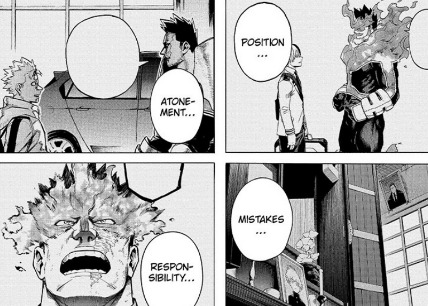
But, then it immediately centers on himself. For the most part, Enji seems to truly be upset not about the people he hurt, but rather he’s lamenting the fact his life has gone so wrong that he has to feel guilt in the first place. I think this is central to Enji’s stagnation and the lack of overall progress in Enji’s arc, he still doesn’t really think he did anything wrong.
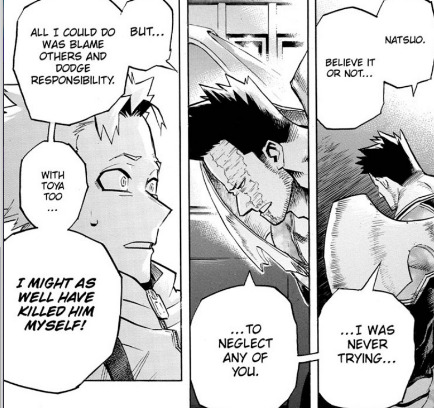
Or rather. Look at hos he frames Toya’s funeral portrait a “Mistake.” He also repeats the same thing when he tries to talk to Natsuo. He says that he was never trying to neglect any of them. Which is, you know, a blatant lie if there ever was one. Toya calls himself a failure, because Enji literally referred to him and his brother and sister as a failure. We’re shown the flashback where he was kept away from his brother and sisters multiple times. He literally chose to treat three of his children like they didn’t exist, and not even let the youngest talk to them and he can’t own up to the fact afterwards.

And, this once again ties back to personal narrative. Enji believes, and this has been the problem with him since the Pro Hero Arc that his true problem is that he wasn’t a good enough hero. A lot of people didn’t like the sudden inclusion of Enji’s backstory, but it makes sense to some extent, Enji’s regret is his father wasn’t strong enough to protect an innocent girl from a villain and died when he was young, therefore becoming the strongest hero makes it so he can never die and abandon his family the way his father did. Except. He does abandon his family.
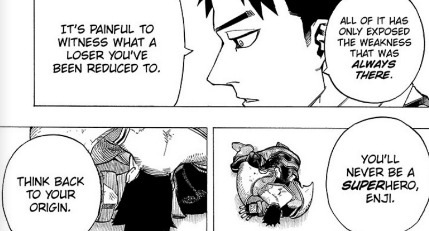
Enji can’t face what he has done wrong, because of his self-justification. He is a hero, and therefore he always has good intentions, and he can’t be the villain even when his own actions would make him one. Enji is on such an insane level of sunk cost fallacy, that in his mind, after the death of one son continuing to abuse another son is justifiable because otherwise he quite literally let one son die for nothing.
And, it’s this refusal to even face the fact that he can be wrong, which is why Enji ignores the feelings of everyone around him, and generally lets things fall into ruin. All Enji had to do was show up on that hill the day Toya burned to death, but something so small as lifting a finger is just impossible to Enji who cannot confront his own flaws, or even think of himself as the bad guy in any way.
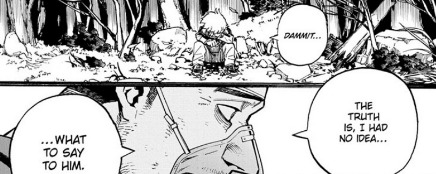
Which is where we get a common trend between both Hawks and Endeavor, in which, they do not want to face the feelings or even the memories of their victims. In the Todofam dinner arc Enji tells the funeral portrait of Toya he wants him to come home and have dinner, but when he has the oppurtunity for that he won’t even face him and talk to him. Toya is just so much more convenient to face when he is a regretful memory, a mistake on Enji’s part, because then Enji is completely in control of the narrative. He barely thinks of Toya at all, and when he does it’s almost entirely on his own terms.
Toya even comments on this, that he was always running and crying to Natsuo and Enji didn’t even know because he didn’t care to know. We have this same behavior repeated in Hawks. Hawks is really only comfortable seeing himself as the good guy.

@thyandrawrites wrote two meta in regards to Hawks I want to reference now. This one on how Hawks thinks he has to continually justify his existence by acting as a support and helping others, and this one how Hawks in turn dodges responsibility when it comes to light he’s not the good guy.
Hawks is someone a lot more complicated than Enji, because he’s not selfish, and he doesn’t really hurt others for self-gain. If Enji is a black hole, then Hawks is more like a sattelite. He does everything, including dirtying his own hands for the sake of others, and a greater good he likes to believe he is serving rather than for himself. In fact, it often comes at expense of himself, as Hawks has no real life, or friends or place in the world outside of being a hero.
While he is different in intention than Enji, however, I believe it’s still right to call him out on basically everything he does to avoid guilt after the fact. “Doing dirty things for the sake of the greater good” is one thing, but Hawks in total denial of his actions can’t even see himself as dirty. Which once again we return to personal narrative, Hawks’ personal narrative and his self perception trumps everything, even the feelings of other people he is stomping on.
To quote Thy on this:
So this brings us to the present arc. Right after a raid that failed largely because Hawks wasn’t able to warn the heroes of the threat they were about to face, Hawks reacts by shutting down. If his existence is defined by how helpful he is, it goes without saying that he cannot accept being responsible for the huge death toll resulting from the failed ambush. So we witness Hawks not thinking critically at all about his share of responsibilities. He doesn’t think about what it meant to kill Twice.
This was the post-apocalyptic scenario that Hawks envisioned and wanted to avoid, the scenario he killed Twice in order to avoid. But it still happened, and yet we don’t see him reflect on it at all. What he does instead is clinging to something that gave him a sense of purpose before.
Being a tool instrumental to other people’s success.
Which in a way means that the same character stagnation that is present in Endeavor is there for Hawks as well. He has not changed in any significant way since his introduction in the Pro Hero Arc, effectively holding the same beliefs and making the same decisions as he did back then. That he needs to uplift Enji as a hero, and his own personal hero, even after learning the truth of who Enji was.
And, we have this same guilt-avoidance mechanism that is at the root of Hawks’ stagnation the same way it is with Enji’s. Hawks practically does the same thing that Enji does to Toya with Twice, despite literally murdering him with his own hands, instead of taking responsibility for his own actions, or even I don’t know... at the bare minimum... feeling sorry about it, he chooses to remember Twice as an idealized memory, compartmented into a neat little box in a way that’s very flattering to Twice.
It’s not “I killed Twice and I regret it” it’s “I want to learn from Twice and be helpful just like he was.”
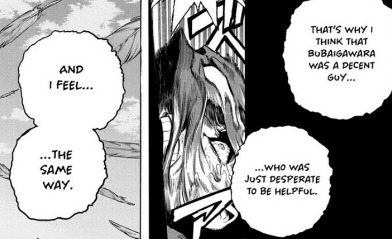
In doing so he belittles and ignores not only Twice’s feelings, but also his entire memory. Hawks and Enji both kind of want to believe their own internal narration that deep down they are good people, and their intentions and actions are those of a good person, and therefore everything they might have done wrong along the way is just a mistake or a slip-up on the road. Hawks always returns to the memory of him selflessly helping the people on the bus, because he wasnts to believe who he is at heart, but that’s also not how he is.
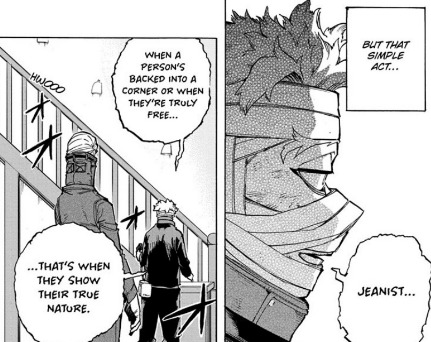
They have no identity outside of being heroes, and yes it’s tragic to think they would crumple if ever faced with or trying to process the feelings they outright ignore, and also doubly tragic in Hawks case that he was groomed to feel that way by hero society at large from a young age, I also think it’s important to look at the cost of their actions. Hawks and Enji actively harm people, and get away with it with a slap on the wrist, and because of that they don’t reflect or change on their actions and they continue their bad behavior.
It’s important to remember in Toya’s backstory, if Enji had just stopped and given up on his abuse of Shoto after Toya died, then Dabi would never have come about, and Toya would have come home. It’s this subtle escalation that happens when Enji is not confronted about his actions, and even enabled by the people around him to keep doing his bad behavior, it gets worse and worse over time.
The whole point of the Todoroki household is that it didn’t have to get as bad as it did, but it happened because no one tried to stop Enji, and Enji was so good at self-justification he didn’t try to stop. Which is why I want to point out, it’s not just harmful for Hawks himself, it doesn’t just stunt his growth as a person, it’s extremely harmful to the people around him, because he cannot admit his mistakes and he cannot grow for them and so therefore inevitably he will repeat them again. In fact Hawks has gotten worse in some ways, which is where I want to reference Thy again.
Hawks even outright plays the victim. He’s not doing a public apology through a press conference because his personal ethics tells him it’s the right thing to do. He’s doing it because he knows it’s expected of him, which just isn’t the mindframe of someone who understood the gravity of his actions. From his phrasing, we can parse that he thinks that heroes like the top three are being put under scrutiny for no good reason, and like this is a test of his own endurance, when it should be a matter of proving his good faith. Hawks just killed a man who was running away, and he’s acting like it’s unfair that the world is holding him accountable for it.
The reason why Hawks thinks that society turned on him is because he justified Twice’s extrajudicial killing to himself as something he was doing to protect that same society that is now ungrateful for his personal sacrifice.
Hawks own motive of doing everything for the greater public good has been corrupted, because his killing of Twice did not give him the validation he was seeking. Which reveals once again, Hawks is not entirely selfless, just like a person he wants validation, he wants encouragement, he doesn’t do everything for the sake of the greater good. If he really believed his own personal narrative that he can sacrifice himself and others for the greater good and get his hands dirty and it will all be justified in the end, he wouldn’t be pouting because people criticized him.
There’s a certain fragility to the ego of both Hawks and Endeavor where they can’t really accept any outsiders perspective on their actions at all, because everything has to be in line with their narrative, their own personal hero stories.
Everyone talks about the differences between Nagant and Hawks, but there is one new angle I would like to bring in. Perspective.
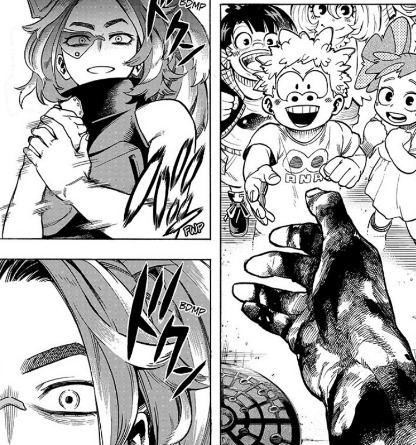
In the end what stopped Nagant from blindly following orders was her seeing her own self as dirty, after doing the dirty works of others. Nagant accepted the guilt of murder, and realized in comparison to the ideal way that the kids she was signing autographs for her saw her, she wasn’t living up to the hero they saw.
Nagant was able to divorce herself from her own self image, and because of that she actually changed and took action against the corruption of the hero’s council. Lad Nagant if anything is capable of change in a way that Hawks isn’t, because Hawks can’t perceive any fault in his own self.
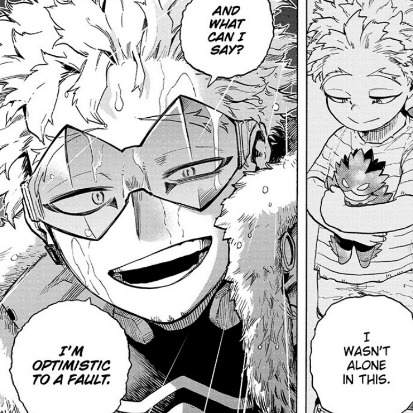
“I am optimistic to a fault.” almost quite literally in this case. When he is confronted with the reality of who Endeavor is he prefers to choose the image of a hero he saw as a child, and on the way he actively enables Endeavor to keep doing wrong by his abuse victims. Of course he says Endeavor is living to atone, but Hawks essentially advocates for doing what is worst to Toya which is ignoring Toya entirely, and on top of that making Shoto fight against him for Enji’s convenience.

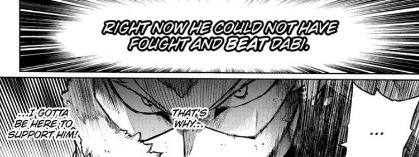
He remembers Twice in a positive light as someone who was helpful and wants to be like him, but when faced with a Twice who returned from the dead just wants to murder him again. Nagant says, the public gets to stargaze at the bright and shiny side, while the dark truth gnaws away from someone else.

And this, I think is key to understanding why Hawks mental spiral is so harmful because it doesn’t just harm himself, other people are always going to get hurt too so Hawks can maintain his fragile ego and sense of self. Hawks may be a brave hero able to courageously risk his life but at the same time he is an emotional coward, he cannot face himself or his own emotions or even when he does something wrong simply because he is too scared to.
And, yes the villains do this too but they at least at the bare minimum do not think they are good people.
#mha meta#my hero academia meta#my hero academia theory#enji todoroki#endeavor#takami keigo#hawks#jin bubaigawara#twice#toya todoroki#dabi#bnha 374#bnha 374 spoilers
469 notes
·
View notes
Text
That time Togashi straight out told us the real story in YYH is in the subtext, through - what else - subtext 🤣


This was in the manga chapter immediately after Kuwabara seemingly defeated Toguro in the Yukina rescue mission, after he seemingly falls in love with her at first sight without even knowing her name or who she is. 🤣
In case you're wondering what this seemingly throwaway reminiscence from Togashi is referring to, here's the "translation" of his subtextual meaning: 🤣
Togashi in above notes: "I wasn't the type to blatantly and directly defy school regulations... I'm the type who live to defy the law in indirect and clever ways that eludes the notice of the teachers so I can play right under their noses without getting caught or having my fun (manga, games) taken away from me."
=
What Togashi means: "I'm not the type to blatantly defy the authorities like the censors or the powers that be at Shonen Jump by blatantly writing the real story in the main text, I'm the type who defies the authorities by cleverly hiding the real story in the subtext, which eludes the notice of the authorities so I can have fun right under their noses without losing publication or being forced to stop."
As though to make sure we understand that Yukina is a proxy character for Yusuke where Kuwabara's feelings are concerned, the official Chinese manga even has fourth wall dialogue to tell us through Hiei that Yukina was captured by slavers because she broke the rules to play with animals in the mountains and was easily discovered while playing.

Yup, Togashi told us through this fourth wall dialogue that he'd lose his freedom to play (i.e. tell the real story he wants to tell), just like Yukina lost her freedom, if he makes the Kuwameshi love story too easily detectable, coz that's against the rules. 😭
Also, the fact that Toguro was the one to inflict emotional torture on Yukina by killing her bird friends foreshadows how he's the one to torture Yusuke emotionally by killing Kuwabara in the dark tournament. Yup, the narrative itself uses Yukina as a proxy for Yusuke, just like Kuwabara expresses his feelings for Yusuke through the proxy of Yukina. And oh yeah, birds are a symbol of Kuwameshi romantic love in YYH anime. The depth of subtext is always mind blowing 🤯😜
As for what the real story is - well, Togashi & Anime Studio Pierrot told us this countless times throughout canon, through subtext that shows us what the real story is about, while telling us the narrative misdirection (i.e. the cover lie) of what the story seems to be about, fourth wall dialogue that straight out tells us things they want to make sure we don't miss 🤣, sequence of events which reveal cause-&-effect and thus True Character Motivations, mirror & proxy characters, body language cues, even lighting & background music of scenes, choice of clothing & colors for characters, etc.
Ya know, basically all the same techniques that are used in storytelling outside of anime in good live action films & series for adults, which makes YYH a Truly Great Work of Art that bears repeated viewings, because the subtext is so rich & deep, I guarantee it will blow your mind ;P
If you take nothing else from this post & ain't the type to read meta or subtext, just "trust me bro" on this 🤣- YYH is about Life and what makes life worth living, Death and what's worth dying for, all the ways in which we can destroy ourselves and each other, all the ways in which we can save ourselves and each other, the complex nuances and grey areas that people exist in outside of the simple duality of "Good" vs "Bad", Kindness, Mercy, living by your own Moral Code and standing up for it, Friendship, Family both biological and found, Humor, Tragedy, Marginalized & Misunderstood people and how at the end of the day we're more alike than we think, all the bittersweet ways Life can break your heart while filling it to the brim... but most of all, Yu Yu Hakusho is about LOVE.
Tagging @sadique-angel coz you enjoy YYH subtext and the way Togashi did it here with his seemingly throwaway reminiscence is brilliant 🤣❤️👌
#if you read the subtext you can't NOT realize Togashi was giving voice to the voiceless marginalized people of his time#the LGBTQ community#the elderly who're dismissed as old and senile when they actually have so much to contribute#the single mothers who were ostracized in 90's Japan#the kids who never got to be kids coz they had the bad luck of lousy parents#the delinquents and so-called trouble-makers#the misunderstood people at the margins of society#kuwameshi#kazuma kuwabara#yyh#yusuke urameshi#yu yu hakusho#kuwabara#kuwabara kazuma#yusuke#urameshi yusuke#kuwameshi meta#yyh meta#yu yu hakusho meta
12 notes
·
View notes